#and as a work of like speculative sci fantasy it does relate very much to the earth and how it will be once we're gone
Explore tagged Tumblr posts
Note
Do you think that the reason we don't see the people from the new world is because some time after putting away Hyness's people they found away to travel to the real world?
I'm gonna say first off that I don't subscribe to the (fanon?) belief that the people of the New World/Forgotten Land WERE the Ancients who did all the stuff we'd heard about up until KatFL. I think they're their predecessor, and I had a post about that before. Basically thematically and on a meta level it makes sense to me everything about the Forgotten Land is to be squished at the beginning of this universe's timeline.
So by that measure I think that the in-universe implication is that the people of the Forgotten Land BECAME the Ancients of Halcandra. I think they found a way off that planet and to another dimension (or another galaxy cause i have pet peeves) with the knowledge they learned from Elfilis, and then settled on that planet. Hence how all those ancient artifacts that look nothing like those of the Forgotten Land, but use Eflilis' powers - mixing tech and magic as Hyness said they once did - came to be. And then sadly it seems that the successors of those people who fled the Forgotten Land due to resource issues never learned and destroyed themselves too. Maybe escaping like their ancestors, maybe not - who knows! But basically, the people of the Forgotten Land are from the past of the past, the Ancients of the Ancients IMO.
Now I remember there were a lot of fun easter eggs in KatFL and the Music Fest that hinted to the idea of the Forgotten Land being connected to or even a post-apocalyptic future of earth, and as fun as that is to speculate about I think the in-universe idea is that they weren't like, literally us or became us. I think it was mostly for funsies, but is a really fun idea to explore, and I'd be willing to change my mind if there was more expanded upon that. Like... per se if it became that the Halcandra Ancients only came across remnants of the Forgotten Land to learn everything they did instead of being the result of their diaspora. It would be a more hopeful alternative to the nuclear winter Shiver Star Theory atleast, I don't really like that one.
KatFL and all its info is still new to the mythos so we'll see how it gets fleshed out as we go along. I think the biggest reason why we never SEE them or their image is because it creates a fun sense of mystique like why the hunters in Bambi were never shown, which I really enjoy. I like that you could very seriously read this as what will happen to the earth or as something separate from us because of that vagueness. It's what makes Kirby lore fun to talk about ^_^.
But right now, my personal theory/headcanon is that they became the people of Ancient Halcandra, who then did all the wacky shenanigans we know and love them for, and then faded into history.
#kirby#katfl#shut the heck up#ask heck#kirby lore rambles#i was really lost by this question at first and idk why hdsgf#but its a lot of fun stuff to talk about i could go on and on#but yeah i think any hints that the people are related to irl humans is mostly just like some fun sprinkles#to get your brain whirring#and as a work of like speculative sci fantasy it does relate very much to the earth and how it will be once we're gone#which were themes i adoooored how they were handled in the game i love animals!!!!!!!!!!!!!!#also as always thank you for asks i like being asked to talk about things
2 notes
·
View notes
Text
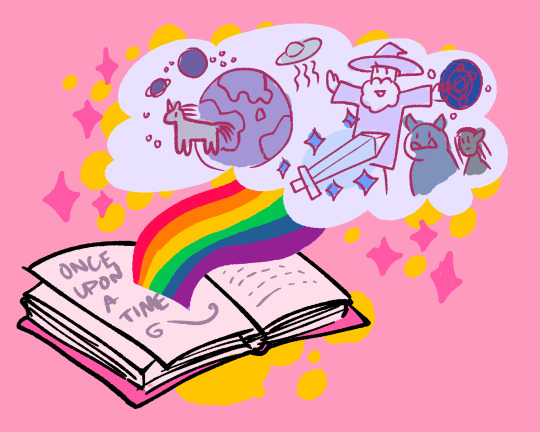
Screen Tones, a Webcomic Podcast
Show Notes
Lore
Release Date: May 25, 2022
Featuring
Kristen Lee (Krispy) She/They https://www.ghostjunksickness.com/
Christina Major (Delphina) - She/Her, www.sombulus.com
Ally Rom Colthoff (Varethane) - She/They http://chirault.sevensmith.net/ http://wychwoodcomic.com/
Claire Niebergall (Clam) - She/Her, www.phantomarine.com
In This Episode:
LORE! We all love it, we all have it. It’s that cool secret sauce that makes sci-fi, fantasy, supernatural, or other speculative fiction so much fun to make theories about. How does this funky world you made up work? How do you keep it all consistent, and make it an interesting part of the story? Today we’re gonna talk about it!
1:50 How do you come up with the lore for your story?
You can find inspiration from different languages, like Krispy gathered a lot of ideas for locations, names, and religions and such from Greek translations.
When coming up with lore, you want to make sure you make sure it all makes sense and matches the tone you're trying to get with your story.
Another form of inspiration is simply mashing up things that you love. Claire mashed up some of her favorites (water, blue, spooky, death) and built her world to include those concepts. Thane loves white hair and pointy ears and funky magic systems so had to develop a world all of those aspects could fit into.
Writing a prequel or flashbacks for your comic can force you to develop the lore of your story. Often this is most beneficial in developing lore that directly impacts the main characters.
Another route to take is to establish the rules of the world that are set in stone. From there, you'll get to discover how your characters relate to that rule and how those rules affect the way society runs. It also helps to demonstrate things so readers can understand what is happening.
Now a lot of the time you want to figure out how all the lore affects things and connect, but it's okay to embrace the Rule of Cool and just go with it because you want it there.
28:10 How do you keep track of the lore that appears in your comic, and make sure it all makes sense?
Krispy has lots of handy dandy notebooks! Make notes of everything and how it intertwines to try to avoid contradicting yourself. Set a few concrete rules that you will always follow. Keep track of questions you get regarding the lore so you can reference them later.
Clam lives on the edge and keeps most of it in her head, occasionally dropping in lore specific pages in between chapters. A lot of comics have their own wikis that make for a useful lore collector. Keep it limited and find a few things you go VERY deep on.
Thane is an archeological dig of lore that keeps building and covering over the old as the new comes to light. Google docs or other cloud based services make for good lore to allow for access from multiple devices so you can make a note when it comes to you. Often what is in the comic becomes the only concrete lore.
Delphie opts for less permanent note options and uses a lot of scrap paper. If a block of text is intimidating, document the lore in a different way, like designing a travel brochure, or graphical poster. Document the canon and leave the rest to be swirled around before it makes it into the comic.
41:50 Can you have too much lore?
This depends on the type of story, the length of the story, and what type of lore. Application of the lore matters. There's no one size fits all.
If you're intimidated by the world building and the amount of lore you have, don't be afraid to tone it back or wait to establish it until its needed in the story.
43:00 Do you have any advice for creators about worldbuilding?
If you're unable to keep something straight, find a way to document it so it can be easy for you to keep up with. Make a glossary if you need to.
Use words that are similar to known words. If you're making up words completely, make sure you define it for your readers, and yourself.
Use your lore to build the story. Start simple and basic and build up to the complicated details.
Leave room for flexibility. Your story will often evolve as you go on and your lore may change with it.
Thanks for Listening!
Have a comment? Question? Concern?
Contact us via Twitter @ScreenTonesCast or email [email protected]
Screen Tones Cast:
Ally Rom Colthoff (Varethane) - She/They http://chirault.sevensmith.net/ http://wychwoodcomic.com/
Christina Major (Delphina) - She/Her, www.sombulus.com
Claire Niebergall (Clam) - She/Her, www.phantomarine.com
Kristen Lee (Krispy) She/They https://www.ghostjunksickness.com/
Megan Davison - She/Her, https://www.webtoons.com/en/search?keyword=megasketch
Miranda Reoch - She/Her, mirandacakes.art
Phineas Klier - They/Them, http://heirsoftheveil.fervorcraft.de
Rae Baade(Rae) - they/them, https://www.empyreancomic.com
Renie Jesanis - She/They , www.kateblast.com
2 notes
·
View notes
Note
Yes, the weak writing in TOA is what mellowed me out on the series. Despite my distaste for all the decisions after the first third of the movie I can't say it disappointed me because no matter how excited I was I didn’t have high expectations because I know what it's like. It's funny because I never completed the series. I got through half of Trollhunters and 3lbelow before I just had to leave. It took me a month to finish Wizards and that one's my favorite. So yeah.
(Following on from this ask.)
That's fair. Like I said before, I'm in a pretty similar boat when it comes to Tales of Arcadia. Trollhunters was good and - barring a couple of episodes which I fast-forwarded through because the tropes/ execution of the premise wasn't for me - I had a really enjoyable time with it. But then it reached the end and it felt like there were a lot of questions (changelings etc.), worldbuilding (heartstones etc.) and general complexities (Merlin as he was talked about throughout the series vs Merlin as he appeared at the end) that were left hanging to a frustrating degree.
Now, in fairness, I tend to experience "wait, that's it?"-ism at the end of a lot of TV shows that run for more than a single season - it's probably just the nature of the medium/production environment that makes it hard to match the impact of hours of build-up in just a handful of final episodes, especially since a lot of shows won't know they're on their final season until that season - but with Trollhunters, it was a very intense feeling of "wait, that's it?".
Part of the reason why I initially watched 3Below was that I had hoped it would continue building on the unanswered lore questions from the first series (a fairly common thing for sequels/ spinoffs to do) but instead it took a hard right-turn into aliens and sci-fi. And - much as Douxie is probably my favourite ToA protagonist - by Wizards it became clear that even when we were going back (heh) to the more Troll-adjacent fantasy world, most of those questions still weren't going to be satisfyingly answered, if at all.
Part of me wonders if this might be a small blind-spot of Del Toro's when combined with Netflix, since outside of ToA most of his resume is film, and film has different structural/ worldbuilding/ storytelling conventions due to the much shorter run time. A 'film ending' would probably feel underdeveloped at the end of a TV series because shows by necessity have to add and flesh out more concepts to fill their run time. Just speculation through.
By about halfway through 3Below I was definitely watching more out of a sense of analytical curiosity and 'might as well see it through' than because I was still invested and suspending my disbelief. If I'd made it dedicated watch (rather than something to have on while sewing the Purrloin Plush) I probably would have stopped at about midway through 3Below, so I totally get where you're coming from with that.
As a sidenote: The way Wizards handled the Merlin/amulet/Morgana's-hand point from Trollhunters felt almost like a cop-out to me. Like they were trying to walk back/ distance Merlin from the morally callous nature Trollhunters both showed and suggested in some antagonists' dialogue, by making it seem like far less of a deliberate scheme from him, having her turn 'bad' for unrelated reasons ahead of time and someone else being the one to actually cut her hand off. Which kind of retroactively makes it weird that she claims he "took her hand" in the first series. That line made it seem more morally complex (that maybe she became a villain' because she was directly betrayed/ wronged by one of the heroes) but then her character gets weirdly flattened. Tales of Arcadia's moral stance on Merlin is just very unclear and strange in general.
With all that said though, I think there is value sometimes in going in to something with no expectations - or knowing/ expecting it to be bad - as an exercise in analysing storytelling. One upside is what you said; because you're not really invested/ aiming to become invested you don't end up being as disappointed by bad writing. (It's that weird sort of optimistic pessimism - if you expect the worst then you'll either be right or pleasantly surprised).
Consuming media with the intent to dissect it from the start does give a different experience... but then again no-one watches True Crime Documentaries or Mayday: Air Disaster because they want to experience a perfectly normal day where everything goes well and no-one gets hurt. Some days you just want to watch a train wreck in slow motion and try to work out what went wrong.
I actually did this with Dreamwork's Voltron - I went in having already read discussions, watched a full analysis and knowing it was going to go downhill, because I was curious to see how it was going fall apart so thoroughly that the fandom almost unanimously agrees that it's a mess. Funnily enough I was kind of surprised: not because it wasn't bad (although the first three seasons are genuinely fun) but because it got bad in ways I didn't expect. Most of the discourse I had seen was ship-related so I'd sort of expected a generically mediocre story with some 'Kataang vs Zutara' level character chemistry fanning the flames, but no - the central narrative and structure of Voltron just completely falls apart. It's wild.
And - much as it's always is sad when a series doesn't live up to it's potential - I kind of prefer when a story 'shows its hand' so to speak fairly early on in terms of writing weaknesses. For me, it's almost more tolerable to see the flaws and accept that you have to look past them as the price of entry. It lets you manage your expectations - you're consuming the story in spite of known problems, so it doesn't feel as bad if/when those flaws get big enough to make the story not worth continuing with.
Call it honesty, or maybe just closure, but I'd rather a series that's kind of stupid from the start to one that starts off strong/competent and then gets really unexpectedly stupid all at once. The former tends to sting a lot less.
#trollhunters#trollhunters: rise of the titans#tales of arcadia#Really starting to make me realise I have a strange relationship with ToA#I don't dislike it. but. I also don't feel any surprise that the flaws that were there right from Series 1 toppled it#It could have been better#and it's sad that it wasn't#But it's also kind of exactly what I knew I signed up when I continued past Series 1 despite my feelings about those flaws#So I don't feel mislead or like it in any way made a false promise about it's trajectory/ themes/ quality#(You already know which series I DO feel that way about)#also I feel like the way each Series ends with characters from the next series popping up to help with plot feels too Deus Ex Machina#Definitely the worse offender was when Aja and Krel just showed up and solved the Lightning in a Bottle puzzle for the Trollhunters gang#At the cost of building any metaphorical answer or having Jim Toby and Claire do proper problem solving#Aja and Krel were such a weird way to handle it since it didn't even really build much mystery for who/what they were#3Below kind of makes it better in retrospect but in Trollhunters it's still 'weird exchange students show up with solution just go with it'#very strange choice#Voltron is the only series where I got to the point of saying 'I give up' 'I cannot tell what will happen next' OUT LOUD while watching#ATLAS turning into another robot very much broke my brain and punted the remains of my suspension of disbelief into the sun#youmaycallmeyourhigness#3WD Answers
11 notes
·
View notes
Text
May 6, 2021: The Martian (2015) (Recap: Part One)
We’re leaving lo-fi sci-fi, people. Kind of.
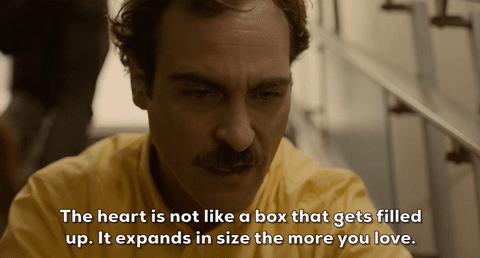
I mentioned before that films like Her are what I define as “lo-fi sci-fi”, which is a category that I’ve kind of made up. Basically, it’s the science fiction version of low fantasy, meaning it contains science fiction themes contained within an otherwise contemporary setting. In the case of Her, Joaquin Phoenix’s character, along with many others, live in a world and setting basically like ours, but with technology advanced enough to generate AIs (like Siri) that are intelligent enough to actually ascend our reality. Because we live in a society.

You give me Joaquin Phoenix, I’m gonna make a Joker reference; it’s in the contract of my existence. Anyway, that is admittedly kind of broad, right? I mean, that has the capability of crossing over with a BUNCH of sci-fi genres and themes. And, considering that we’ve already seen magic, speculative technology, time travel, monsters, and artificial intelligence, we’ve already touched on quite a bit.
And with science fiction, the sky’s the limit. Literally. So, I think it behooves us to re-examine lo-fi sci-fi a little bit. Specifically, we should note that it can also be defined as an extension of currently existing technologies and possibilities. Writers would call this “speculative sci-fi”, assuming in this case that it’s set within the present or a near and attainable future. Her definitely fits in this category, as does Westworld. But, let’s crossover to another genre by speculating upon another possibility. And it begins with this man. Probably.

Hey, Elon, what’s up? Now, Mr. Musk here is a...controversial figure, for COMPLETELY understandable reasons. Instead of touch upon the man himself, I feel like touching upon one of his recent focuses: space travel. With SpaceX and the various upcoming space trips and journeys that they’re planning, Musk has made it clear that he plans to shoot to the Moon. Again, literally.
In fact, this full plan is to go even further than that, and to fuel potential commercial space flights in the future, which is admittedly very cool. And of course, if you’re going to shoot for the Moon...

Guys...guys, that’s Mars. THAT’S FUCKING MARS
Is that not amazing? We have sound and pictures from FUCKING MARS! THAT’S A DIFFERENT PLANET, GODDAMN IT! It’s cooler than I have the ability to properly express, but it IS goddamn cool. And this means that, easily within my lifetime, we could (and likely will) land on Mars. Which is amazing. God, I really want to see that happen.
And so, landing on Mars is BARELY science fiction, but since we haven’t yet done so...yeah, it’s fictional at the moment. And so, any film about landing on Mars falls within this category. Well...to an extent.

2000′s Mission to Mars, for example, was a Disney-funded film (to my IMMENSE surprise; and it’s based off of an old Disney World ride, WHAT), and a movie that I saw a LOT when I was a kid. I also barely remember it, to be honest. But that film is straight-up science fiction because of, well...aliens. The idea of Martians is, as far as we know it, fictional. And most fiction involving Mars includes these aliens somehow. Whether it’s DC Comics’ entire civilization of Martians, as seen in Justice League, Supergirl, or Young Justice...

...Sir Arthur Conan Doyle’s heavily mythologized civilization, as seen in the Barsoom series of novels (and another Disney film)...
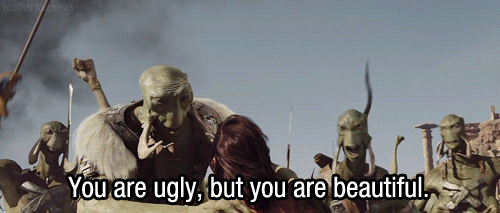
...Or one of the best Looney Tunes characters.
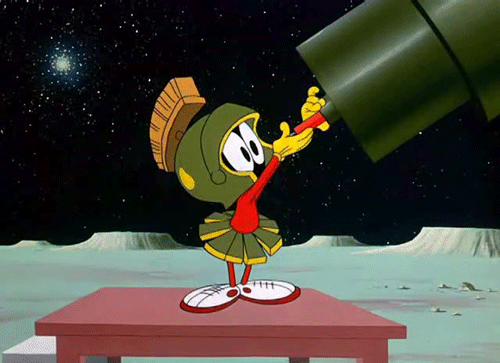
Mmm. Yes. Isn’t that lovely?
But, yeah, Mars and aliens go hand-in-hand in our media. So, to properly look at lo-fi science and speculative science fiction in relation to the Red Planet, we’ll need a movie that goes to the planet, and doesn’t touch upon the concept of aliens AT ALL.
Enter...Ridley Scott?
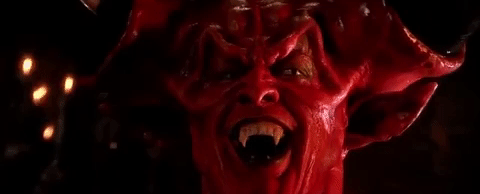
Yeah, the director of Legend, Alien, Thelma and Louise, Blade Runner, Gladiator. Also the director of Kingdom of Heaven, Prometheus, Exodus: Gods and Kings, and...ugh, 1492: Conquest of Paradise. I’ve talked about his mixed record before, in my Recap of Legend right here.
In 2014, he was brought on to adapt a book by Andy Weir called The Martian, which is a great book! I’ve listened to the audio book, and I whole-heartedly recommend doing that. And because of that, I am VERY MUCH looking forward to watching this film, especially seeing as it’s often called one of the best science fiction films made during that year, and was critically acclaimed then and now. It got seven Oscar nominations (although it won none of them), amongst other awards. So, enough navel-gazing, huh? The Martian!
SPOILERS AHEAD!!!
Recap (1/2)

On Acidalia Plantitia, at the landing site of the Ares III mission, a group of scientists are gathering samples. These scientists are commander and geologist Melissa Lewis (Jessica Chastain), pilot Rick Martinez (Michael Pena), systems operator Beth Johanssen (Kate Mara), surgeon Chris Beck (Sebastian Stan), German chemist Alex Vogel (Aksel Hennie), and overly talkative botanist Mark Watney (Matt Damon).
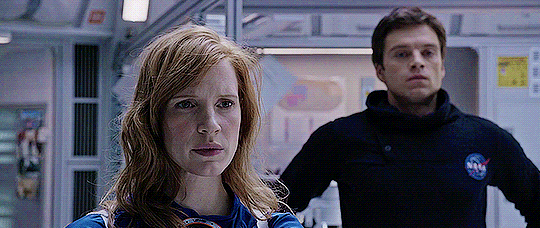
The group seems to have a good dynamic, but that dynamic is interrupted by a massive dust storm, which is large enough to cause the entire crew to evacuate. However, in the chaos of the dust storm, Mark is hit by debris and lost in the shuffle. Although Lewis goes back to find him, she can’t get to him before they need to leave, and Mark is believed dead. This is reported (pretty callously) by NASA Director Teddy Sanders (Jeff Daniels) to the press soon afterwards.

But of course, that wouldn’t be much of a movie, now would it? Mark’s alive! And Mark’s alone. With his suit damaged, and low on oxygen, he trudges back to headquarters, which is intact and still contains breathable oxygen. He gets inside, and realizes that he’s been stabbed in the abdomen by some debris. He removes it, and stitches up his own wound. Which is...god, it’s fucking BRUTAL just to think about, nevertheless watch.
Once he’s finished, he records a log for the future, if he doesn’t make it. It’s day 19 of the 31-day mission at this point, and Mark’s basically screwed. He needs lasting oxygen, water, and food, and he might need that for 4 years, when the next manned mission can come to the red planet. Additionally, he has absolutely no way to contact NASA, leaving him completely stranded. Another dust storm rolls in that night, and Mark looks over the belongings of his colleagues, packing them up for their eventual return. It’s somber, to say the least. However, Mark affirms that he’s determined not to die on the planet.
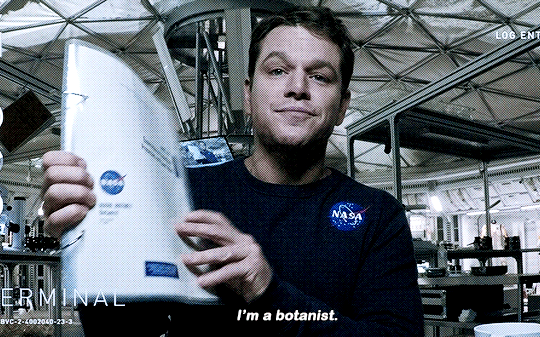
After doing the math, Mark should have enough food to last him for about 300 days, especially if he rations it. Until then, he’ll need to figure out how to grow his own food, on a planet where nothing grows. Which is, of course, going to be a difficult feat to accomplish. But Mark Watney’s a botanist with botany powers, and he’s gonna do it.
It’s day 31, and Mark’s brought in dirt from the outside, and uses the bio-waste from the crew’s stay there for a form of compost. After 5 days, mostly full of him watching Happy Days on TV and trying to farm, he realizes that he needs water, both for himself and for the soil. To do that, he goes chemical and decides to use hydrogen-laden rocket fuel, wood from Martinez’s belongings, and good old-fashioned fire to make water! And since hydrogen + oxygen = water, it should work. With a minor side-effect.
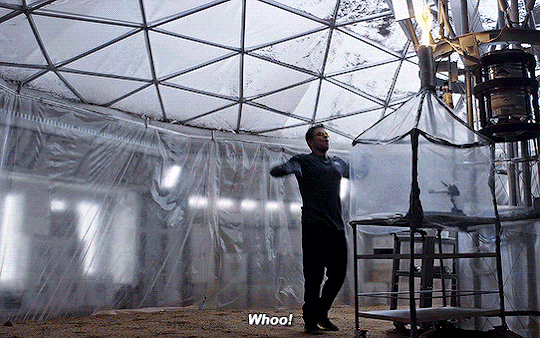
So, yeah, he blew himself up. As as he records a video log, the sound mixing makes itself impressively known by subtly and realistically generating a tinnitus sound. It’s VERY well-done, holy shit. Anyway, he makes a stable fire, and the place is soon covered in condensation, moistening the room and the soil successfully.
We get to day 54, and Mark’s planted leftover potatoes from the crew in order to grow them. And while he’s being mourned at a funeral on Earth, and in NASA, he’s seeing the fruits (or shoots) of his efforts.

Back on Earth, Mars Mission Director Vincent Kapoor (Chiwetel Ejiofor) is trying to convince Director Teddy to let him lobby for another Ares mission, despite the risk of bad press for the callousness of the proximity to Watney’s death. Meanwhile, satellite technician Mindy Park (Mackenzie Davis) looks down at the Ares III site, and realizes that the site has changed visually, meaning that Mark may actually be alive.
Shocked by this, she tells Kapoor, Teddy, and media director Annie Montrose (Kristen Wiig) about this, and they realize the absolute clusterfuck that this whole thing is. They can’t tell the other members of the Ares III crew about it, because it’d devastate them for the 10 months they have to get back to Earth, at the VERY least. They can’t tell the WORLD about this, because they just had a funeral for the guy, and they’d reveal that they left him stranded on Mars accidentally, destroying faith in the Mars Missions Program. And they can’t save Mark, who they’re sure will starve eventually. It’s a mess. And Kapoor also wonders what’s happening to Mark psychologically through all of this.
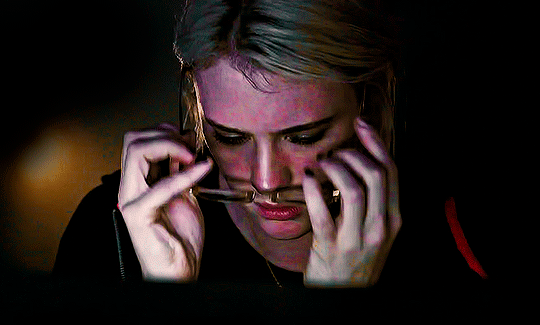
And yet, they reveal this to the world regardless, causing the clusterfuck reaction that they think it’s going to cause. But Mark’s busy on Mars, figuring out how to get to the site of the next Ares IV mission in 4 years, at the Schiaparelli crater about 50 days travel away. This is a struggle, as his Rover has only so much power and fuel, and he can only get more power by cutting out the heater is risking death by freezing. So, problems. However, he figures out a potential solution: radioactive isotopes! In a move that is, let’s face it, COMPLETELY INSANE, he digs up a radioactive generator from the ship in order to heat the ship.
On Earth, they try to figure out Mark’s moves, as well as how to resupply Ares IV sooner for Mark’s benefit. This is with the director of JPL, Bruce Ng (Benedict Wong), and the flight director of the ship Hermes, Mitch Henderson (Sean Bean), who insists that they tell the Ares II crew. They continue to monitor Mark, and note that he’s been travelling for 17 days in his Rover towards something. Kapoor figures it out, and flies to California.

See, Mark needs a way to contact NASA, and he believes that the way to do so is through Pathfinder, the first probe ever sent to Mars in 1997, lasting for 9 months since landing until they lost contact. Mark digs it up, and the people at JPL in California start their own efforts for contact. And despite communication being extremely rudimentary, initially limited to yes/no questions that use a still-frame camera, it fucking WORKS! WHOO!
To boost this communication hurdle, the two camps figure out a hexadecimal system for communication, allowing them to communicate using a circular table of numbers that represent an alphabet. That allows them to teach Mark to hack into the Rover, allowing it to piggyback off of its broadcast signal and send them messages via keyboard. Nice! Now that communication is reasonably possible, Mark’s able to ask how the crew is handling his death. But upon learning that they haven’t told him. He’s understandably a little goddamn enraged. And so, they FINALLY tell the Ares III crew about this.
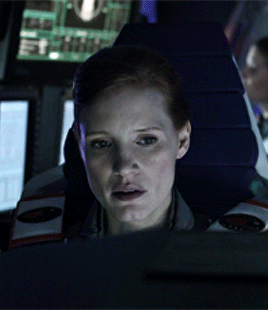
The news breaks the crew, even though Mark continues to stress that he’s all right, and that it wasn’t their fault. Meanwhile, Mark’s able to survive for 912 days with his potato plants, and things improve with the help of technicians on Earth. They plan to launch a supply rocket to him in the next year, and things are looking fine! Unless, of course...something goes horribly HORRIBLY wrong.

Well...fuck. Good place to pause for Part Two, then?
#the martian#ridley scott#matt damon#jessica chastain#kristen wiig#jeff daniels#sean bean#michael pena#chiwetel ejiofor#benedict wong#science fiction may#sci-fi may#user365#365 movie challenge#365 movies 365 days#365 Days 365 Movies#365 movies a year#bookstofilm#whatelsecanwedonow
13 notes
·
View notes
Text
Also, and I’ll shut up then, I dislike this reccing culture by the authors’ and characters’ demographics and nothing else so much, but especially in science fiction. Listen. I get it in dramas and romance and such. THUG being written by an American Black Woman is relevant af to THUG. The gays being gay in Charité is relevant to the series about Nazis being homophobic. Sometimes, it’s going to be relevant to Sci Fi, too. Like fuck yeah Octavia Butler being Black is relevant to most of her work. Except Bloodchild is also choke full of stuff about gender and trans-ness imo.
But quiet frankly, I (primarily) pick my genre fiction on theme and quality of execution, and I recc on theme, because that’s the thing I’m going to take away from it. If the demographics are relevant (eg, this is transhumanist sci fi with a trans disabled mc!), add it, but, like, include the theme/subject maybe? It’s wlw! cool. what is it about. It’s wlw in space! yes but what is it about. it’s wlw necromancers! So is it about ... death? life? grief? bodies and our relation to them? transhumanist themes? what happens to grief in a world where people can come back? something entirely different? From what I can tell until now, it’s about religion. should I read it because of the world building? because of the characterisations? because of the plot?
Like, I can’t recc anyone anything anymore because I’ll describe the actual book (’So they have these machines that download peoples memories and then transfer them to a new person, kind of like Trill but not, I don’t want to spoiler it, but the author does some very interesting things about personhood and self with that! Adn I’d love to discuss that with you if you read it, too’) and they won’t even listen to me until I say ‘also it’s wlw’, even tho it’s completely irrelevant to the book. Literally I cannot explain how much this book is exactly the thing everyone’s always on about about ‘casual’ representation, except for how it ties into the IMAGOs and advanced medicine creating ... interesting af implications about gender and sexuality (do people perceive themselves as gendered in a world where roles of mother and father become detached and fluid, where women don’t ‘have’ babies anymore, etc? What does this do to concepts of family? How does having a bunch of people and their memories and feelings in your brain affect your sexuality and love life?). And idk, often I get the vibe they kinda. Forget all the themes and warnings I told them before? And, personally more annoying, I can’t find anything to read, because I genuinely do not give a shit who the mc is snogging if it’s not a) about specifically that thematically or b) a romance or c) at that point, probably, both.
And also, again, often themes double as warnings, and I’m tired of walking into shit blind-sided. Not knowing what it’s about might upset or trigger me, but it also makes reading/watching/listening less enjoyable, because idk wtf I’m supposed to be looking for! Is this a horror movie? Do I have to watch the background for ominous shapes? Is this tech thematically relevant, a plot device or just set dressing? Are we on a desert planet because the story expects me to know Dune? Is it about Iraq? Am I supposed to ignore the fucking desert because it’s just Romance In Space anyways?
And maybe this is a very mean opinion, but if your speculative fiction has nothing going for it except the romance, it’s bad and also not speculative fiction. Like that’s a romance novel with a sci fi or fantasy setting right there, and those are great, but if you market that as Sci Fi (with romance) you’re just trying to crawl from one ghettoized genre into another one and also congrats, you’re the Nicholas Sparks of Sci Fi. Except none of these books ever are! They have great things going for them! It’s a fucking disservice and insult to the book and the author to recc them exclusively by who’s putting their lips on whom and what skin colour and mental and physical state they have while doing it!
‘well but people just want to read books about people like them for once, alb. you have to understand alb. it’s for social justice, alb. you’re being regressive by insisting speculative fiction by marginalized authors and/or about marginalized characters should be read on the merits of it’s speculative elements, alb.’
:/
3 notes
·
View notes
Note
"Re: The third point, I could go on about the specific example of Dragon Quest and how I think Undertale works best when read as a response to that franchise + similar series in particular" do you think you could find the time to elaborate?
Fair warning. This one is a bit long.
Let’s talk about Dragon Quest.
Overview
The Dragon Quest series of games (originally localized as Dragon Warrior in the U.S. due to a copyright/trademark issue) is pretty much one of the “Big Two” JRPG franchises alongside Final Fantasy. It’s extremely big in Japan, while enjoying more moderate success in the United States.
I’m not going to go into too much detail comparing the two or talking about their history, but I think it’s relevant to note that Dragon Quest games tend to be straightforward, high-fantasy stories in a way that a lot of beloved JRPGs (Final Fantasy included) aren’t. You’ll fight a robot from time to time, but sci-fi elements beyond that are rare; explicit social commentary/allegory is extremely rare; the plot rarely becomes especially bizarre or complex, with the narratives tending to rely a lot on characterization to make an impact; and so on.
(I should note that none of this is a bad thing, per se - I love Dragon Quest games. DQ8 and DQ11 are some of my favorite RPGs of all time, in large part because of their gorgeous settings and excellent character work, and I’ve played a fair few!)
Monsters
With that being said, if you know anything about JRPGs, you probably know how the player spends most of their time in a Dragon Quest game - going from town to town and dungeon to dungeon, fighting a wide array of whimsical monsters. (big ups to Akira Toriyama for his excellent character designs, with the exception of the Cyclowns, which I hate a lot.) There’s sidequests and minigames and such, but by and large, this is how the player interacts with the world - find monsters, fight monsters, get strong enough to fight the Big Boy monsters, maybe halfway through you start fighting the occasional anime boy or possessed dog.
The role that monsters play in the narrative is also, for the most part, very simple: they’re almost exclusively the minions of either the local boss/miniboss, or of the big mean demon lord you fight at the end of the game, and pretty much all they do is terrorize villagers, cause mayhem, and so on.
Note that I said almost exclusively...
“Don’t worry, I’m a nice monster!”
...because in basically every Dragon Quest game, some monsters are chill and friendly. Most commonly, this will be a slime, the franchise mascot:

Sometimes they’ll show up at the bottom of a well and give you a trinket for talking to them, other times they’ll hang out in a dungeon and give you some lore or a hint about a nearby puzzle. They say a lot of things like “goo-ness gracious” and it’s very cute and charming, and, uh, hang on, these guys talk, and make puns, and aren’t just bags of XP and herbs? Okay. Sure.
Depending on the game, you can often encounter other monster friends as well. Sometimes there’ll be a town with friendly monster NPCs to talk to; other times, beating monsters allows you to recruit them to your party or your Monster Arena team. It’s neat.
But what never changes is that it’s some monsters that are nice. A tiny minority. And they’re only ever a curiosity, a side note. They’re the exception that proves the rule, and the rule wants to kill you.
Which brings me to:
The One Guy Who Isn’t Evil
There’s a thing that a lot of speculative fiction does where cultures are set up as broad and all-encompassing. These are the Primitive But Kind Bear Goblins, and over here are the Mafia Slugs. These are the Prissy Forest Guys, and they hate the Gruff Cave Guys.
This isn’t necessarily bad writing, but it can be a bit repetitive and one-note after a while, so a lot of speculative fiction also has The One Guy Who Isn’t Like That. The illogical robot, the pacifistic/intellectual barbarian, the pragmatic and materialistic guy who bailed on the monastery.
And, of course, The One Guy Who Isn’t Evil. The vampire who doesn’t drink human blood. The dark elf paladin. That one dragon from Skyrim with the cool speech. They’re very useful characters, in that they soften the Troubling Implications of an entire species or ethnicity of bastards, and there’s a lot of cool stories you can tell about their conflict with family and former friends, and perhaps even... with themselves... with the beast within.
At the core of these stories is the assumption that a creature capable of thinking independently and acting on their own free will can always choose to be good, regardless of their “nature.”
But this goes both ways. If something is capable of choosing to be “good,” or even “nice,” they have to be able to conceive of these concepts. To make that choice. They can’t truly be Made Of Pure Evil, or be beasts acting on instinct, or be slaves to the will of a much more powerful entity.
Are Slimes People?
So, in the example of Dragon Quest, we’ve reached a conundrum. Some monsters - very few, but some - are nice, or at least open to conversation. Most are only there to, pardon the phrasing, kill or be killed.
Which means there’s basically two main possibilities:
Some slimes are nice and they’re always already nice. They attacked you first so it’s fine. Don’t worry about it. It’s fine.
Slimes are definitely all thinking, feeling beings, and it’s probably a little fucked up to kill a bunch of them because you’re saving up money for the casino, even if they “attacked you first” after you spent a half hour running in circles, Erdrick.
The first one works fine for the context of a story like Dragon Quest, because we can employ suspension of disbelief. But it kind of unravels if you look at it for too long. In some installments, there are evil but non-hostile monsters who won’t attack you, but will deliver a whole little monologue about how cool Lord Merdur of Fort Finalboss is. And, hey, what causes a monster to decide to be nice instead of evil?
For the most part, we never learn, because it doesn’t matter. The Nice Monster is a throwaway character, usually a bit of a joke. They’re there for flavor, not because of what their existence implies.
And that’s kind of weird, right?
Undertale As Response
It’s obvious how Undertale works as a critique on level grinding and the like, but this alone would be kind of facile, imo. People will say, “well, that monster was trying to kill me, so I acted in self-defense. It’s only fair.” And it can be difficult to argue against this without getting into weird arguments about monsters’ Actual Motivations or the relative negative utility of thousands being imprisoned beneath a mountain vs. seven children being killed.
Here’s the thing that I think a lot of people ignore, though. Undertale is also a critique of the idea that Some Monsters Are Nice, as seen in Dragon Quest and similar games. And part of why that critique works is because it does not allow you to set up a dividing line. All those monsters have a place in Underground society - you can’t simply write some off as Fights while viewing others as worthy of kindness or redemption.
If you spare Toriel and Papyrus, because they’re nice and well-meaning... then how can you justify killing Undyne and Mettaton, who are kind of assholes, but have good intentions, and are pillars of the community?
If you spare Undyne and Mettaton, how could you justify killing Whimsun, who’s terrified of you? Or Temmie, who’s just kind of scatterbrained and weird? Or Snowdrake, who constantly tells bad jokes, just like your friend Sans would if you had to fight him?
So how could you justify killing Tsundereplane and Vulkin, so desperate for affection?
So how could you justify killing Muffet, so desperate to save her family and friends?
And so on, and so on, until we reach Moldsmal.
Oh! That One’s A Slime! Is Maxie Tying It All Together?
Trying to, anyway.

This is Moldsmal and Moldbygg. They’re called that because they’re Jell-O Mould monsters.
Moldsmal just kind of sits there, lazily firing bullets. Its description says it has “no brains.” If any monster is okay to kill, it’s this one, right?
Moldbygg pretends to be a Moldsmal, but is actually big. It also has explicit boundaries and preferences: It does not want to be hugged. You spare it by Not Hugging it. It’s goofy, but still: Moldbygg, explicitly, has thoughts and emotions.
And if it’s not okay to kill Moldbygg, how the hell are you going to justify killing Moldsmal? They’re both slimes! They’re practically identical! Maybe they have family reunions where instead of eating the Jell-O one of them just sits on the dining table! You don’t know!!
So Here’s My Thesis On The Morality of Undertale Or Whatever
Fundamentally, the commentary Undertale is making on the idea of the “nice monster,” the “recruitable monster,” the “monster town,” is this:
If one monster can be your friend, is there actually a reason all of them can’t be?
And it says “no, what, that’s dumb,” and I don’t think it’s wrong to do so. Viewing Undertale specifically with this additional context, of the weird push-and-pull certain RPGs have between “that’s a monster! kill it for loot!” and “okay well not that monster,” shores up the related critique of XP grinding by rooting it in a more specific moral core.
Anyway I hope that all made sense, I’m gonna go eat exactly one maraschino cherry and have a glass of water
#ask#anon#undertale#dragon quest#long post#this is a bit meandering but i hope y'all enjoy it regardless
643 notes
·
View notes
Text
Dad Advice, Originality, and Writing
About a year or so after I left college, I went to work for my father at his small parts machine shop “part time.” (That never happened.) I worked on the floor running a mill power, a drill and milling machine that could be programed with a computer (to make your life that much easier and faster.) Every job that came out of the office came with a job sheet and the job was broken down into where the job went on the floor. You were to use this sheet to mark down the day you worked on the job, your initials and how long it took. (This was supposedly to price the job.)
If the part was a part that the shop had done one hundred times before, the side of the sheet had an estimated amount of time that was based on the time that other employees before you had taken to do the job. Now, I was new. I’d never done any of this before. And so I remember asking my dad about those times and saying I knew that I couldn’t be that fast!
He told me: “Worry about what you’re doing. Don’t worry about what other people are doing.”
That advice came in really handy as I worked in the shop. I spent two years on the floor mostly running the mill power and focused on what I was doing and doing it to the best of my ability and not worrying about how fast I was or if I became the best mill power machinist ever. (Now, this did irritate some people for different reasons. Other people didn’t care. All I cared about is if my father, my boss, thought I was doing a good enough job. Period. Then I took over the office and I didn’t give a shit about how long it took them to complete jobs as long as the jobs were completed before they were due! Not an easy task given the way things were ordered.)
Now, I apply that advice to other areas of my life adding it to my lifetime perspective in writing and in general. Worry about what you’re doing. Don’t worry about what other people are doing.
Because, I can’t control other people. I can control me and I can control my reactions. That’s it.
Boundaries.
At this time since I had a job and a steady income I was buying a lot of traditionally published books and trying to find new authors to read. And I kept slamming up against kitchen sink urban fantasy with protags that actually weren’t what they said on the tin and had no shit clue what they were doing with all the archetypes and tropes that come from being a kitchen sink urban fantasy. The few that had original concepts, like Weather Wardens or Death’s Daughter, were grossly lacking in the good plot department. (Just my opinion.)
I, um, got fed up. I mean. I’d been fed up with kitchen sink urban fantasies for a while. At the same time, none of the high fantasy stuff was really catching my interest and the science fiction that wasn’t the “lone soldier fighting a war on an alien world” was really hard to find and as far as I know, still is. (And what I found was very plot focused and dry.) But I still liked werewolves. I still like vampires. I still like space operas. I still love high fantasy with elves and magic and bad fairytales.
After binge watching the first few seasons of the Sons of Anarchy and having watched the Expendables 2, I finally got an idea that had been a tiny spark in my brain from my college days about biker werewolves. But I wanted to be different. I wanted some “originality.” I wanted to have that Post-Apocalyptic Mad Max, Dredd mixed with Minority Report type of feel. But I still wanted it to be urban fantasy without it being “kitchen sink” with every vampire, fae, werewolf and other fantasy race in existence. And my love of Vampires and my love of Werewolves had a fight and a piece of advice from a college professor of “No Vampires” and that tiny spark of an idea of biker werewolves really blossomed into an idea.
Reading all that, it’s still not really original. Werewolves. Mad Max. Sons of Anarchy. The Expendables. Where is the originality in that? (Heathens may not expressly be the best example for this to be honest, but bear with me.)
But who would want to read yet another werewolf story? How is yet another book about werewolves even remotely original? I mean, I just typed it, it’s Expendables and Sons of Anarchy drawing from Dredd and Mad Max and Minority Report and there’s bits of Star Wars Wraith Squadron and Ratchet and Clank and Starship Troopers in there too actually and I mean, that sounds like a tangled mess of inspiration. All of this shit has been done before, who’s going to read that?
I didn’t really think about this when I started compiling ideas and really digging into research about werewolves and biker gangs and planning my post War World 3 setting. Because, I wasn’t worried about that. Other people could be worried about that, but I wasn’t worried about that. I knew I was genre mixing in an out of the box way that wasn’t on bookshelves in that combination even if the concepts themselves, the building blocks weren’t original.
Because, I’d already proved that people would want to read something like that through my own actions! I was the one going “I like kitchen sink urban fantasy,” and picking up the first three books of every series I could find that remotely interested me (and supporting those authors) in hopes of finding a new author to read that was entertaining as the authors I already had on my shelves.
It wasn’t the author’s fault that my tastes weren’t precisely lined up with what they were writing. They had a story they wanted to tell and if the blurbs of their story didn’t actually reflect what was in the pages or if the books had things that I didn’t like. I was free to stop buying them. These books are huge series, some have hit the double digits! People like them. They’re getting sales. Just because it’s not to my taste doesn’t mean they aren’t decent books.
I mean, look at licensed books such as Star Wars, Star Trek, Forgotten Realms and so on. These books are huge parts of the expanded universe franchises of those stories. People buy them. (I bought almost all the old EU of Star Wars.) People collect them. People saw the Star Wars movies and wanted more Star Wars and then bought books and comics and other merchandise for that franchise because they liked that thing. Science Fiction fans are likely to watch Star Trek, Star Wars, Battle Star Galactica, Star Gate, FarScape, Lexx, Firefly, KillJoys, Dark Matter, The 100 and anything they can get their hands on that’s space opera related because they like that sort of thing even if it’s the same type of thing in different trappings. Look at how many series Star Trek has and it’s all the same universe! SeaQuest and SeaQuest DSV was space opera IN THE OCEAN.
Maybe I was being out of the box in Joss Whedon does a Western in Space type of way, but it wasn’t wholly unoriginal.
My third perspective on this came from being in fandom. There is nothing quite being in fandom where fanfiction and fanart are encouraged and there are tons of people with tons of ideas and yet somehow there are 50 Coffeeshop AUs, or 100 Highschool AUs or good lord, the MERMAID AUS, “let’s write this missing section of canon” stories and “let’s get so and so together” stories and “this is what happened after this scene” stories. And lots of them, if not all of them, get views and likes and comments and kudos and so on and so forth. And sure, they have the same premise, but they aren’t all exactly the same. They have different styles. Different POVs, different events. They started out with the same building blocks and came up with different plots and ideas! (Now, whether they were any good is a matter of opinion, just like any sort of book writing.)
You see, people crave certain types of stories. Those are the stories they like. They’re comfy. They’re familiar. They’re old friends. They sit down with a certain type of story they know to an extent what is going to happen and no matter what type of story it is, they’ll more than likely enjoy it because it’s familiar and comfortable.
People don’t like the unfamiliar. They don’t like being uncomfortable. When someone sits down to read they’re sick, bored or lonely. They want to have the warmth of an old friend. They don’t care about originality. They just want to escape. They’re risk adverse.
Originality doesn’t appeal to the risk adverse.
Firefly was risky. Western in space. Cowboys Vs. Aliens is risky for the same reason, a science fiction western. Aliens in the old west! People aren’t always prepared to take that next step out of the box of genre conventions despite the masses and masses of amounts of different types of speculative fiction stories. You start adding things they don’t expect (like Western to Sci Fi) no matter how much Dark Tower they’ve read or Vampire Hunter D, they are likely to back up and go “I’m not ready for this!”
Not that originality is easy to find. I’m sure someone out there wrote the first “IN SPACE” story. Our stories are made from building blocks of old stories, myths, legends, fairy tales, stories we’ve read and the stories that go on around us in the world at the moment. (Truth being stranger than fiction.) Originality is a very difficult beast to come by.
The fourth perspective of this came from Fashion Design classes and Project Runway. If you give ten people the same inspiration, those same ten people are going to come up with ten different things because they’re bringing in their voice, their aesthetic and their experiences and style to the design. I don’t care if you have ten different “hard vs soft” designers. They are all going to “hard vs. soft” in a different way! Sadly, in my classes we never really experimented with this overtly! (One girl and I did have a similar inspiration for a design class once, Thailand. We were very different people and did very different things.)
Project Runway sometimes does this by giving the designers the same types of materials or the exact same brief. And it’s interesting to see how each of them actually run with it and what they turn out in the end for good or bad. (The more limiting the brief the more interesting to see how this plays out actually, often in unconventional challenges, but not always.)
This is the same with writing. Your kitchen sink urban fantasy isn’t going to be Jim Butcher’s or Patricia Briggs’ or Kim Harrison’s or at least another half dozen writers I have forgotten the names of. Your voice, your rules, your world building, the setting, the characters are all going to be a point of difference between your story and their story. The point of difference is your voice. Your writing style and your voice are your brand of writing.
So what if you’re writing another kitchen sink urban fantasy? There are lots of people out there that love kitchen sink urban fantasies. As long as you’re writing the best and most polished kitchen sink urban fantasy you can in your own style and voice, then don’t worry about the other people writing kitchen sink urban fantasies and not being original or that your writing is inferior.
You know what readers see, “MORE KITCHEN SINK URBAN FANTASY. MINE!”
It's the Two Cakes thing:
https://helpfulwritingstuff.tumblr.com/post/175643753023/lbibliophile-salt-of-the-ao3-pervocracy
Look, stealing from one person is plagiarism. (And I do mean word for word, idea for idea here.) Stealing from many people is research. And if you’re compared to someone else and it doesn’t matter for good or for ill, that’s great! That means there is an audience for your writing! So what if they don’t think you’re as good as the other author? Or maybe they think you’re better than that other author? Why does it matter? As long as you’re putting out the best possible work you can put out in your voice. You aren’t that other author! Don’t worry about them. Worry about you! You’ve got to move on to the next book and the next set of characters and the next idea.
You can’t control what readers (including editors) think about you or how they compare you to other authors. You control your reactions. Sure. Go ahead. Get emotional. Let the emotion run its course. Come back and see if you can learn anything from that critique. Or, you can accept that readers are critiquing for other readers and not you. They all have opinions. Everyone has opinions, it doesn’t mean they’re good or even applicable opinions! You have to find people to put around you that you trust know your vision and what you’re trying to convey to an audience and find that editor that pushes you to improve the way you write or the way you pitch. Worry about what you’re doing.
Don’t worry about what the readers are doing outside of reading. You can’t control it.
And honestly, if they don’t like what you’re writing. They have fan fiction.
You, as a writer, don’t exist in a vacuum. You can bar yourself away from social media and society and write the most original concept you can think of writing and submit only to find out that someone else had the same type of concept even though you’ve never met and never read each other’s works. Why? There are a lot of ideas out there floating around. No one owns them. No one owns how they get to be combined. But your concept and their concept will be different in execution. The building blocks may be the same and maybe they built a fairy tale castle and you built a brooding manor house.
This is the universal consciousness of mankind. People all over the world coming up with permutations of the same building blocks over and over again and creating wonderful things that reflect their experiences and share their voice!
And if you let that get to you, that someone out there might have the same idea as you do. Then you’re going to be paralyzed and not write anything at all for fear of “not being original.”
Being original doesn’t matter. Execution matters. Your voice matters. Once you get past that originality is Queen then you can focus on you and your story. Worry about your voice and your execution and creating the best book possible for your audience, the people who want more of your type of comforting stories.
So, as daddy says, “Don’t worry about what others are doing. Worry about what you’re doing.” Because, that’s all you can control, you and your reactions.
As for me, I have my post-apocalyptic urban science fantasy adventure werewolf stories, my broken fairy tales, my sometime in the future kitchen sink urban fantasy bakery adventures, a urban fantasy magical horse game, and a straight out science fantasy space opera adventure thing to write. So many ideas, possibly none of them original all ripped out of building blocks of other things, but you know what, they have my voice and I don’t care. People who like that sort of thing will like those sorts of things.
Happy writing!
3 notes
·
View notes
Note
Here's what I find so baffling if Pablo REALLY IS leaving AG-- It's universally acknowledged by the whole fandom that 2x07 was one of the best episodes we've seen so far. Might actually be the best. Right? So WHY would they kill off the actor who brings so much to the show? The actor who led most of that episode? To quote King George from Hamilton, "I'm perplexed."
Yeah…you’re not the only one. And ooh, not just 2.07, but 1.07 is usually lauded, along with Laura’s 1.04 episode, as the best episodes of AG. Make of that as you will, but my theory? Tangential digression incoming…
It’s mostly, imo, because Sweeney and Laura have the most movement out of all of the other characters on the show. You can argue Wednesday does as well, and we’ve seen a few sides to him as a character who gets the plots moving, but he, himself, in terms of growth has stayed pretty static. And that goes for most of the gods on the show. By their very nature, they’re sorta these established archetypes.
Whereas Sweeney and Laura have had an enormous amount of growth and character reveals that you really start to see the different dimensions and root for them. You see their flaws, their strengths and their evolving dynamic, and it draws you into their world and their adventures.
I clearly have things to say about this…
What’s also noticeable about Sweeney and Laura’s arc is that their end goals are very defined and clear; we know what the characters are in pursuit of: to get Laura resurrected so Sweeney can get his coin back. And we’ve seen them at various points where things were very plot-driven, and then other times, character-driven. That balance, I think, is so important in creating successful characters that will compel your audience to care, to feel invested and rapt in what’s going to happen next. On the eve of Endgame, I think the MCU is a great example of what’s virtually a long-form television show with both action and character moments that have really captivated the world to care enormously in seeing how this whole saga ends. And they did it through establishing interesting characters first and who feel human and relatable. And I think the same could be said about Sweeney and Laura, who are arguably, the most interesting characters on the series to me for the same reasons.
So, why would they kill off Sweeney, an MVP for the series? Because the story of Sweeney, from the show’s POV I’d imagine, is done. It’s as Pablo has said in recent interviews - he got his battle, and he redeemed himself by dying in said battle, bringing his story full-circle. But he died remembering who he was, as a powerful deity, a god king, not as Sweeney-the-down-and-out-leprechaun who spent the last few centuries drowning in whiskey, and that’s important if the show decides to usher him back in with Laura’s potion. That’s the hopeful, in-show answer. But also, there’s nothing that piques interest in a serialized tv show than the death of a major character…especially fantasy/sci-fi ones where the possibility of that character coming back isn’t so final and depressing - Jon Snow being the most obvious example. I mean, if the show has a considerable fanbase, this can really ramp up interest and get people talking and tuning in, which to a studio like Starz means better ratings and $$$.
And because we don’t know anything truly for S3, that’s all we have to speculate on and just hope that he’ll be back. And I’m hesitant to say that, if he’s NOT back, blame needs to be put on the show, because for all we know, it might’ve been Pablo’s decision to not return; he’s been fairly open about the issues on set for S2, and maybe he decided that he’d had enough. I mean, I hope not, but unfortunately, cast departures were one of negative aspects of the Fuller fallout. I wanna say I have faith that, because Pablo loves Sweeney that he’d stay on to see it through, but I wouldn’t be surprised if he’s not back and that one reason why is because the creative differences behind-the-scenes that occurred in S2 led to an unpleasant working environment. And I’d rather he just be in a happier environment than miserable just so I can get my shippy rocks off, you know? But I’m hopeful, anon, and I totally feel everyone’s frustration and pain. I’m there, too. But..as I’ve said, nothing’s set in stone, so…let’s wait and see. :)
24 notes
·
View notes
Text
First Impression: Neon Genesis Evangelion
Get in your robots, audience, it's time for Paul is Weeaboo Trash! And today, I'm finally watching a show it seems like everyone just... assumes I must've seen:
Neon Genesis Evangelion (1995)
Episodes watched: 8
Platform: Netflix
The idea of something being a "classic" may be in decline in the anime fandom, or at least be getting very specialized, since "anime" no longer implies a narrow interest in specific sci-fi and fantasy subgenres like it used to, but certain shows still manage to pervade the pop culture indirectly. Neon Genesis Evangelion is one such show, enduring in the modern fandom and general internet culture because of its status as one of those old sci-fi anime classics. It has contributed memes — not just as in image macros or running jokes, but as in units of culture in the form of iconic quotes or character designs or elements of the plot — to the point that you have certainly been in some way exposed to them without any knowledge of the source material. But despite its reputation as a must-see cultural touchstone, it has been out of print in America for years. Used copies of the DVDs sell for absurd prices, and I don't think I knew anyone who owned it when I was a young weeb in the mid-2000s. I'm fairly sure my family did not have cable during the one specific season it was on Adult Swim, and there's no chance I would have been up at 12:30AM on Thursdays to watch it anyway. I am not much of a fan of media piracy and wasn't even aware of that option when it was apparently everyone else's favorite pastime to ruin their computers with sketchy torrents. So there was never a reasonable way for me to watch it, only for me to be dimly aware that this was An Important Show I Need To See. Until now. Because it's on Netflix. As if I hadn't already been awaiting it, I was aggressively reminded of it, because social media and geeky news outlets were soon blowing up with retrospectives and Very Serious Analyses — and fans of the old ADV translation were offering hot takes on how Netflix's release compares. So let me finally check this out for myself.
We start out in the distant future of... 2015, where UN forces are defending Tokyo-3 ("Old Tokyo" is mentioned and depicted later; no mention yet of Tokyo-2 unless I somehow already forgot it) against an attacking "angel", an immensely powerful alien with barely-comprehensible powers. Meanwhile, an officer of a UN agency called NERV, Misato Katsuragi, brings our main character, 14-year-old Shinji Ikari, to an underground NERV base under Tokyo-3 on the instructions of Shinji's father Gendo, who runs a secret research project. Shinji has been brought there to pilot an Evangelion, or Eva for short, a giant robot operated by some sort of neural interface. In combat. With no training. He is, understandably, not happy about this. After seeing how badly injured the other available pilot, Rei Ayanami, is, however, he agrees to do it — and it works far better than he or anyone else expected. He apparently has an innately great ability to "sync" with however exactly the Eva's interface works. But this only gets him as far as starting the thing up. When he actually engages the angel, he has trouble just getting the Eva to walk, and he feels the pain of the Eva taking damage once attacked, a frankly horrifying feature of the interface. We cut to him waking up in a hospital, but having surprisingly won because his Eva "went berserk", operating on its own. A flashback later shows what happened when he lost control of the Eva: it fought the angel by itself, but also took heavy damage, and we see its visor? faceplate? sōmen? of the Eva's armor come off to reveal a fleshy-looking face and a very biological-looking eye. At this point Shinji blacked out, which is really the only reasonable response to this situation.
Over the next several weeks (the time scale is vague, but since Rei apparently fully recovers from the injuries she had when we first saw her before the time she and Shinji are both deployed, it must be at least 3 weeks between eps. 1 and 5), more angels appear, to the surprise of civilians and UN forces alike. The Evas continue to be excellent weapons against them (though Shinji himself is still, uh, not great at using them), but despite having now killed several angels, the Evas are considered a ridiculous boondoggle by personnel of other UN branches, and Gendo's sinister superiors seem to be losing patience with his project. In the words of... uh... that UN navy guy in ep. 8, "Shit! A bunch of kids are supposed to save the world?" The alternatives are wildly ineffective conventional weapons and a remote-controlled nuclear-powered giant robot that almost had a literal Chernobyl-style meltdown, which was averted by Misato and Shinji. Although repairs are expensive, injuries common, and pilots in short supply, Evas indeed seem to be the only effective weapon against the invading cosmic horror, the barely-comprehensible aliens that are impervious to ordinary human technology and also don't fit our concepts of life or... uh... possibly physics. So, instead, in the words of Misato later in the same episode, "This plan may be insane, but I don't think it's impossible."
While this is going on, Shinji has been adjusting to this new life poorly and slowly. Despite being a pilot, he is still after all a 14-year-old, so he is enrolled into the same class as Rei at a local school whose student body has dwindled as more people evacuate over the initial angel attack. He also needs somewhere to live, so Misato arranges for him to move into her apartment. Some of Shinji's classmates think he's incredibly lucky to live with her, and spend a good deal of their screen time drooling over her, but Shinji is highly uncomfortable around her not just because Captain Katsuragi is his commanding officer, but also because she has a tendency to not wear much clothing around the house and is, er, a bit of a drunk and a slob. Oh, and she has an inexplicable, clawed, beer-drinking penguin. You know, all stuff that would make a nervous, lonely, scared 14-year-old completely at home.
Neither NERV training nor school guarantee a community, though, and Shinji, isolated and confused, could sure use one right about now. He seems quite likely traumatized from the first battle. He keeps ending up in situations that make him wildly uncomfortable while other characters take them in stride. He repeatedly attempts to quit NERV or at least defy orders before backing out (or... backing back in?) at the last moment. It would frankly be bizarre that they accept him doing this, except that (1) nobody really seems to take Shinji that seriously anyway, (2) he's the boss's kid, and (3) most importantly, it seems that only a small number of pilots, all the same age as Shinji and Rei, are even capable of using Evas. (Wife and I are starting to suspect reasons why this might be, especially given the whole cyborgs with neural interfaces thing, but... uh... let's not embarrass ourselves with public speculations about the plot of a ridiculously famous show almost as old as we are.) He only slowly gains any support or comfort from his new classmates and colleagues. They don't reach out to him, and he certainly doesn't reach out to them, because who is he supposed to talk to? His roommate/commanding officer who is twice his age? His classmates who treat him as a celebrity, not a person, once they find out he's an Eva pilot? Even if his default state since the very first episode hadn't been basically imploding into despair with no idea how to communicate that anything's wrong, there's nobody that really makes sense for him to try to communicate it to. Except one person: Rei. He notices that she's also isolated at school, and especially after seeing her dark, miserable, unmaintained apartment, he attempts to be friendly towards her. I thought this might be a hint of growth indicating that he understands she is possibly the only person more isolated than him and the only one who might be able to relate to him, but then the next time he threatens to quit NERV after that conversation, he explicitly claims she doesn't know what he's going though, so ¯\_(ツ)_/¯ maybe he just has bad social skills.
Sigh.
Shinji does start to make friends with Aida and Suzuhara, two of his classmates, though. And it's interesting because they contrast against him in their reactions to the conflict outside. Aida roleplays being in the military and finds Shinji's role as an Eva pilot glorious and enviable. Suzuhara is initially furious at Shinji because his sister was collateral damage — she was injured when Shinji fought the angel — and his mind is changed only after Shinji rescues him (and Aida) from an angel. Shinji, though, having been thrust into a role he doesn't even understand and about which he is ambivalent and unstable, lacks Aida's optimistic admiration of his role and a full appreciation of either Suzuhara's resentment or gratitude. He not only rejects their praise, he calls himself a coward during (sigh) one of his attempts to quit NERV. It occurs to me that this could be seen as indicating different perspectives about the military (ask any American vet who's sick of being "thanked for their service"), or even different perspectives about adulthood itself — I'll bet any millennial who did not achieve their dreams can recognize Aida's "wow this is amazing I can't wait to be a grownup too" roleplaying vs. Shinji's "I am doomed and isolated by the responsibility that has been thrown at me" actual experience in NERV.
Also thanks to the school scenes, we start to learn some backstory, including the famous "Second Impact". A catastrophic asteroid impact in 2000 melted Antarctica's glaciers, which led to unprecedentedly rapid sea level rise, leading to mass extinction, including that of half of humanity through not only direct climate change impacts like displaced populations and crop failures but also conflict stemming from it. Or so the official story goes. It is later revealed that the Second Impact actually involved somehow the previous arrival of angels on Earth, although this has yet to be explained in detail. (Actually, I accidentally saw spoilers about more detail about this while revising this review, because I went to sanity-check myself about some other detail on one of the fan wikis, so I know part of where this is going, but only part.)
Over the first eight episodes, which must be several weeks at least after the start of the show given that Rei has recovered from her initial injuries (although the time scale is very vague), Shinji fights four angels total and gradually improves, but the biggest improvement comes not from him being an individual hero but from finally working well with others. For example, the octahedral angel that drills into NERV's base has incredible abilities to detect and counter incoming attacks. It kicks Shinji's ass on the first attempt, because duh. But Misato devises a plan to test its abilities and concentrate the power of... uh... Japan's entire electrical grid(?!) at it from a safe distance, and the plan succeeds only because of Rei giving Shinji cover. An angel attacks a UN ship convoy transporting the third pilot, Asuka Langley Soryu, and her Eva, and she and Shinji fight the angel together in a ludicrous fight that involves both cramming in to pilot the same Eva together (which, interestingly, requires them to give it the same, or maybe just compatible, instructions together in the same language for it to work... yay neural interfaces). So maybe/hopefully the direction this is going is "the chosen one is a stupid idea and even talented people need both training and cooperation to not suck at things"?
Episode 8 leaves off with Asuka joining Shinji and Rei's school class, and with the dramatic and creepy reveal of an embryo encased in bakelite which is described by Gendo as "Adam, the first human"... Well. That comes off as the kind of thing that would drive the future plot, and hopefully all the Biblical imagery will finally start to converge into something coherent instead of just sort of serving to draw extra attention to the fact that the humans refer to the aliens as "angels". I've been wondering about that since the beginning. There's the title, of course, but also the sefirot in the opening and on Gendo's office ceiling, the first angel's attacks using what appears to be a directed energy weapon which invariably forms glowing crosses, and the fact that most of the angels themselves are wildly non-humanoid (a choice which echoes the rather... eldritch... classical depictions of angels — see also the seraph in the opening). NERV's motto is even explicitly, well, monotheistic at least, if not sectarian: "God's in his heaven. All's right with the world!", which is counterintuitive at best with the idea of calling the alien invaders "angels".
Well. I'll find out, and I plan to write a followup like I did with Re:ZERO, going into the broad swaths of the rest of the plot and my overall impressions of how they handled things. Especially given that this show has a famously-controversial ending. I jumped into this determined to watch the whole series, so I'm not backing out.
I'll just threaten to quit repeatedly then almost immediately come back.
-----
W/A/S: 4 / 3 / I feel kinda bad about this but 4?
Weeb: I mean, anything with giant robots fighting giant monsters deserves a few points just for that, right? I don't think this requires much by way of Japanese cultural references or assumptions to watch, though.
Ass: Nudity so far has been brief, partial, censored by convenient angles and object placement, and not remotely sexy. Thanks to another contextless spoiler I happen to have picked up, I expect an infamous later scene that is clearly supposed to be sad and disturbing in context, which is, again, not the kind of thing this scale was originally designed to describe.
Shit (writing): Even though I tend to overall like their plots, I always sort of sigh and eyeroll at the "let's put children/teens in combat and/or experiment on and/or just plain torture them to force them to become powerful" storyline formula that’s been semi-popular for the last few decades, and Evangelion is definitely in that category. Friends have said the story is confusing or poorly-paced, and I kind of agree but also think some of the confusion is warranted by the choice to enter the story in media res in order to reveal what's going on to the audience at about the same time it's revealed to Shinji. As for the tendency to have some long shots where literally nothing happens, that does get annoying, and I suspect its primary motivation was to save money, but I think it also usually emphasizes how lonely the whole situation is, at least before Shinji starts to warm up to Misato and Rei to Shinji in the last couple of episodes I've watched so far (which have, appropriately, had much more action and interaction). Mainly, my writing complaints are actually about translation, because there are some noticeable and consequential differences between translations for the sub and dub. Yeah, yeah, I've heard of the love vs. like thing everyone on the internet is already upset about, but I haven't gotten to that episode yet. I'm talking about things like Misato saying "it will work!" in the sub vs. just "okay!" in the dub when Shinji is first able to control his Eva, a choice which suggests very different things about both her level of knowledge of the project and why Shinji has been called on for it at all. The new dub also feels... uh... too at home as a dub of a '90s anime, as it prioritizes matching lip flaps over flowing like believable speech. Having not seen the old dub, of course, I can't make any kind of judgement about whether this is a step up, down, or sideways from how ADV did it. And the sub has many on-screen captions in Japanese are left untranslated — not things like signs in the background, but actual captions the audience is meant to get information from.
Shit (other): Maybe we're spoiled in this age of computer-aided art, but i's surprising to see a show with such limited animation — speech conveyed only with lip flaps, obviously reused shots within the same episode, foreground objects gracelessly sliding against a background to indicate movement — and so I'm willing to give the show a pass on most of that, especially since the characters are distinctive and the setting and aliens and robots so interesting. Much of the limited animation actually serves to show the vast scale of NERV's facilities and the Evas vs. the humans and/or to emphasize loneliness like the pacing. But there really are some painful mistakes from time to time in the art: objects and faces that look utterly wrong, like the artists just did not successfully figure out how to draw that particular character or vehicle from that particular angle. The legendary opening theme is certainly catchy — it’s been stuck in my head almost continuously for the past week — but I just don’t think I enjoy it as much as other people do. Some of the immediate complaints that were apparently worthy of news media attention were about the replacement of Fly Me to the Moon with a piece from the show's soundtrack as the ending theme. I understand why people would be upset by that kind of change, but I am willing to take the controversial stand that it's not a bad change. The piece they chose as a replacement is haunting and tense, which fits in with the mood of most of the episodes so far, while Fly Me to the Moon feels to me like an inappropriate mood change from that.
Content: Actually among the least graphic of the various shows I've covered involving violent or horrifying elements.
-----
Stray observations:
- God it was weird to write this by constantly abbreviating “Evangelion” as “Eva”, considering that Wife's name is Eva.
- A lot of people seem to hate Shinji as a character, but I find him understandable in a way that probably implies uncomfortable things about my own sanity. I just... I understand that sheer degree of doom and misery and indecision and inability to articulate any of those. Man. Ugh.
- I don't know if you've ever seen an undisguised angel, but trust me: they're horrifying. (link NSFW)
5 notes
·
View notes
Text
Why Ad Astra is not Science Fiction
(I could’ve revived my old sci-fi blog for this particular review of mine, but I’d have to do a complete overhaul, and it honestly doesn’t seem worth it to be honest. I’m thinking of just using another website for sci-fi talk)
Anyway... Ad Astra is not science fiction because the sci-fi aspects don’t have anything to do with the main plot.
Sci-Fi is about exploring the specific questions we have regarding the impact of new scientific discoveries on our lives, our psyche, and our humanity. It’s taking the improbable and making it a reality as a means to confront the unknown. Phillip K. Dick’s vision of sci-fi revolved around new ideas, a new world, a new different society branching out from our own. Sci-fi makes it difficult to be “down to earth” because it’s about fiction that explores and speculates about the unknown, taking advantage for our capacity of reason. (Whether these sci-fi stories are well-written or not is another story).
This movie didn’t need to be science fiction, if the entire premise really only revolved around personal abandonment issues. The father-daughter relationship was a big plot point in Interstellar, but it added to its sci-fi themes of mankind using science to fight against an uncaring cosmos until the last breath. In Ad Astra, the conflict between the father and son is the entire plot, and the central message is about the importance of appreciating what you have and not leaving loved ones behind. What does that have to do with science and the unknown?
The movie used the sci-fi label as a gimmick to what is a mundane story about the consequences of parental abandonment. The science fiction aspects have nothing to do with the main conflict, and to add insult to injury, it takes far too many liberties with the physics of space travel for the story to have scientific merit. This means that you can’t even justify the screwed physics with the movie being escapist entertainment, because it’s meant to be taken seriously as a drama.
Instead of cerebral, it’s baffling. The movie set up some speculative elements and went nowhere with them. And it doesn’t have the credit of being gritty and realistic, because the science is too over-simplified. Why introduce a world that’s familiar to our own but obviously new and strange, and yet not try to explore it? I’m guessing mankind apparently reached to the point where traveling the solar system is now taken for granted, but there’s not enough focus being put into that fact, unlike in the Blue Danube segment of 2001: A Space Odyssey.
I see some people responding to the feedback with accusations that they couldn’t understand the movie and expected a popcorn flick, but the movie honestly doesn’t require a lot of analysis to get to the point. It’s very obvious and it’s practically spelled out to the audience via narration. Even without the narration, the crux of the drama is daddy issues we’ve seen a hundred times before without any twists. The things that COULD be deep (and more appropriate for sci-fi for that matter), like the confrontation that we’re alone in the universe, are less important than the abandonment issues the movie puts so much more focus on.
As a science fiction story, it’s got its priorities in the wrong place. As a drama, it’s too predictable and obvious. It tries to cover up its simplicity with nice cinematography, effects, and a slower-paced tone, but they can’t save a poor concept execution.
I do know a few ways this problem can be improved.
Explore the fact that space travel is now a routine, borderline mundane practice for this society. Just... put a bit more focus on the sci-fi themes and have them actually relate to the plot in some way.
Remove the narration, since it would make the meaning less predictable. I’ve seen a few people compare it unfavorably to the theatrical cut of Blade Runner, and I’m inclined to agree. I’m not sure if it can fix how unoriginal it is, but at least it wouldn’t be obvious.
Make it so that the main themes themes are how realistic commitment to scientific discovery can’t replace personal, relatable internal conflict. I get the impression this was the original intention, but you could apply this with a work addiction and you wouldn’t have to trip over bad physics.
Be creative and make it a space fantasy “magic realism” dramedy with symbolism. Calling it sci-fi implies there are slightly bigger things to be concerned about. With fantasy, or magic realism, you can get away with bad science.
#long post#review#ad astra#i had way more scathing thoughts about this film#but my focus is explaining why I refuse to acknowledge it as sci-fi#yep
1 note
·
View note
Text
Conveying Worldbuilding Without Exposition!

(As requested by both an anon and @my-words-are-light)
One of the hardest parts of writing speculative fiction is presenting readers with a world that’s interesting and different from our own in a way that’s both immersive and understandable at the same time.
Thankfully, there are a few techniques that can help you present worldbuilding information to your readers in a natural way, as well as many tricks to tweaking the presentation until it’s just right.
Four basic techniques:
1. The ignorant character.
By introducing a character who doesn’t know about the aspects of the world building you’re trying to convey, you can let the ignorant character voice the questions the reader naturally wants to ask. Traditionally, this is seen when the protagonist or (another character) is brought into a new world, society, organization. In cases where that’s the natural outcome of the plot, and the character has a purpose in the story outside of simply asking questions, it can be pulled off just fine. But there’s another aspect to this which writers don’t often consider:
Every character is your ignorant character.
In a realistic world, no person knows everything. Someone will be behind on the news. Someone won’t know all the facts. Many, many someones won’t have studied a common part of their society simply because they aren’t large part of that fraction or don’t have the time for it.
Instead of inserting an ignorant character and creating a stiff and annoying piece of expository dialogue, find the character already existing in the story who doesn’t know about the thing being learned.
2. Conflicting opinions.
A fantastic way to convey detailed world building concepts is to have characters with conflicting viewpoints discuss or argue about them. Unless you’re working with a brainwashed society, every character should hold their own set of religious, political, and social beliefs.
Examples of this kind of dialogue:
“The goddess Irelle would never ask for such a sacrifice! That’s a blasphemous addition to the sacred texts that only a damned cultist would propose.”
“The new lamps in the cockpit might give off a funny light, but they’re entirely recyclable! Think of all the dumps we wouldn’t need back on Earth if everyone would just switch over. If we’re ever going to successfully repopulate the planet, we need to stop polluting it further!”
“This is a peaceful country, yes, but one build on blood and stolen land! If you left your worthless barn more often, you would see that. The rest of the empire is not as placated as you think.”
And as a nice bonus, the reader gets to learn something about the characters beliefs, how they communicate, and how open-minded (or stubborn) they are.
3. Historically and culturally significant places and objects.
Characters bringing up worldbuilding topics out of the blue can feel forced and disruptive, but giving them a reason to talk about a specific topic helps soften the blow. Strategically places buildings and objects can ease the conversation into historical, religious, scientific, or political discussions. Things like:
Religion: Temples, holy books, idols, imagery, religious leaders out for a walk, worshipers praying or singing.
History: Monuments, statues, ancient buildings, historical artifacts (likely replicas), culturally significant designs that arose from mythology, historical fiction novels.
Science: New inventions being installed or tested out, academic buildings, seminar announcements, advertisements, hospitals.
Politics: Propaganda, reminders to vote, new laws being put into practice, angry citizens, protests, war preparations.
(Note that many of these things could also be applied to magic systems!)
4. Ignore explanations entirely.
Sometimes the best way to convey how a world works is just to dive straight in. Let the reader learn about the world by watching the main character interact with it.
This method is also a great way to start out writing your first draft, because there will always be time to adjust and add in stronger explanations for things in later drafts.
Alternately, you could go for the opposite first draft method, and write exposition for everything during your first draft, and then cut it down the the bare necessities once you start editing and rewriting.
** Scroll up to point one to check for an update!
A long list of things to remember:
- Dialogue is better than internal monologue. Whenever possible, let your characters talk about something instead of thinking it through. This eliminates daunting chunks of text and allows the reader to learn more about the other character(s) in the conversation, and the character’s relationship(s) with each other.
- Sometimes you still need internal monologue. Don’t be afraid to slap in some extra sentences of explanation when the PoV character is in a position where they’d naturally think about such things. You can always take them out if readers say they understood without the addition.
- Not everything must be known upfront. Don’t force any concepts on your reader unless the reader absolutely needs to know in order to understand the current chapter.
- Build your worldbuilding. Each concept and piece of information should build off what you’ve already establish. This means you give the very simplest concepts first, and develop them further as the story progresses.
- Use linguistics in your favor. To help your readers remember new names and terms, try giving related objects, places, ranks, etc, similar sounding words or an otherwise consistent naming scheme.
- Keep the first chapter pure. Little to no exposition should be included in the first chapter, whenever possible. That being said, readers who were immersed in the first chapter and are eagerly starting the second are now much more likely to sit through exposition because they’re already connected with the story and characters.
- Immersion is good. (Drowning is bad.) Set your first chapter somewhere the read gets a decent view of what sort of world this is at its foundation. A lone character walking through the forest could live nearly anywhere, in any era, in any type of world, with any number (or lack) of friends of family. A character and their sibling leaving a steampunk pseudo-Japanese theater pressed up against the same forest says a lot more.
But remember: not everything must be known upfront. Don’t try to introduce so much of the world that it becomes overwhelming.
- Little details say a lot. Things like architecture, curses and slang, styles of dress, typical food, even the objects a normal person carries with them, can all give major hints towards the worldbuilding, and they serve to make the world feel more real and immersive.
- Emotion is everything. How does your character feel about the world?
How to they describe the parts of it they love? The parts they hate?
What do they find scary about it?
Are they intrigued by advances in technology and society, or do they cling to the old ways?
Are they attracted to old toppling buildings with historic significance, or to new, beautiful constructs?
Do they sneak past the market eagerly searching for imports from distant countries, or do they make a beeline for the family owned business that’s sold homecooked pies on that street corner for seven generations?
- Different genre, different expectations. Every genre has a different ‘norm’ for how much detail (and exposition) is acceptable in the worldbuilding. Hard science fiction and adult fantasy tends to involve huge amounts of lengthy explanations, where as young adult fantasy and soft sci fi are far more immersive, occasionally to such a point that you can get away with underdeveloped worlds. Know what’s expected in your genre (though don’t necessarily feel the need to follow it.)
- Unique isn’t always better. In spec fic there’s a myth the most unique and original worldbuilding will be the most successful. But the truth is that, while you should certainly include original concepts, the more of them you have and the more original they are, the harder it will be to make the reader understand them. Readers will try to relate every piece of worldbuilding to something they already know. If they can’t find anything else similar enough, they’re likely to either never understand it, or contort it to better match something they do understand.
- If your PoV character doesn’t need to know it, neither do the readers. This doesn’t mean you should never include information your PoV character doesn’t need to know, but rather that you shouldn’t try to shove in a detail about the world just because you have it written in your notes. If it’s not necessary and it don’t come up naturally, don’t force it.
- The PoV character is the center of the world. Each character will see the world you created differently. The things they focus on, the opinions they hold about it, and the emotions it makes them feel will all be unique to that character. They aren’t simply a person living in a vast place you know a lot about, but rather a filter through which to put all the worldbuilding information through.
- Critique will save you. Worldbuilding is hard, and it will never be conveyed perfectly the first time. When you let people read your work, be sure to ask them specific questions about the worldbuilding. Having a reader describe your world in their own words will tell you a lot about whether or not you succeeded in immersing them in an understandable world.
For more writing tips from Bryn, view the archive catalog or the complete tag.
Purchase Bryn’s debut novel, Our Bloody Pearl, today!
#writeblr#worldbuilding#writing asks#writing tips#writing help#writing advice#writing resources#writers#writers on tumblr#world building#writing tag: worldbuilding
19K notes
·
View notes
Text
just wanted to write out a bunch of My Hero thoughts/opinions because idk anybody else who watches it (or who would want to), but i don't really want to get into deep enough into the fandom to see the #drama
so, a bunch of random shit in no particular order:
- this is more about my relationship with anime in general but.... i always feel like i need to put a disclaimer on My Anime Opinions because of the perviness and fanservice and sexualization. it’s frustrating because the “shounen” genre (and yeah i know it’s not exactly a genre. whatever) caters to my interests in so many other ways!!! big, flashy battles, cool powers and magic systems, huge emphasis on The Power of Friendship, cheesy humor, great animation, everything is all kinds of HYPE and EXCITEMENT and FUN....but since shows like this are targeted towards teenage boys and often made by horny men, there’s also Boobs and token pervert characters that serve as an excuse to show More Boobs or Fantasize About Boobs. and the women’s powers are either “look i’m a girl!!!” (there were a couple of women early on in hunter x hunter whose powers were....sewing and vacuuming?? seriously??? and then another one later on who was an older woman who chose to make herself look like a little girl as her superpower??) or “what’s a power-related excuse to make these costumes As Skimpy As Possible” (cough cough Momo and Hagakure cough cough) or even having NO excuse (what the fuck, Bubble Girl, i know it was a fan design contest thing but that never should have been accepted it makes no sense i--) and that’s. really damn tiring and annoying. mha hasn’t quite crossed the line for me yet overall -- meaning my disgust with grape trash and other gross tropes hasn’t outweighed my enjoyment of every other aspect of the story and characters, and i hope that never becomes the case. (i tried to watch 7 deadly sins on netflix and??? the main character gropes an unconscious woman in literally the first episode with no consequences???? no fucking thank you!!!!! i’m OUT)
- anyway if anybody reads this and has any show recs that hit that Good Shounen Hype vibe with good animation, fantasy/sci-fi/superpower elements, but minimal (or nonexistent??) Creep Vibes, please send them my way. i know there are a bunch of good slice-of-life or comedy or drama shows that have queer themes and sensitive storytelling but man.....if there’s no magic or dragons what’s even the POINT
- on a related note, god fucking bless every “AU - M!neta M!norou Doesn’t Exist” fic on ao3, and everyone who makes every member of class 1-a queer in some way or another, so i can get my cool powers and great characters and dramatic plots without the threat of disgust and frustration
- also i just read the School Briefs series and while there were entirely too many chapters/sections that focused on grape trash, it WAS mentioned that Tiger of the Wild Wild Pussycats is canonically a trans man (who hasn’t been killed off!), and Shinso Hitoshi became the only man at UA I respect with one line: “He’s gotta be expelled for sexual harassment one of these days, right?”
- seriously, if shinso’s transfer gets approved i would literally rather have grape trash expelled than whoever ends up being the traitor (if it’s a hero course student. i honestly don’t really care about traitor speculation/theories).
- and yes “only man i respect” includes aizawa and every other 1-a boy who just!! lets shit happen with barely a comment!!! again, bless every fic where grape trash gets expelled early on or at the training camp because Hey, What He Does Is Fucked Up Actually and maybe someone who consistently disrespects and violates his peers’ boundaries and privacy shouldn’t be accepted as a HERO without getting some behavioral therapy first???? same kinda goes for bakugo too though, they really need to address his anger issues and beef with mido beyond “let’s force them to team up in high-stress situations even though this boy basically tried to obliterate the other one on, like, the second day of class. they’ll probably work it out!!”
- and on the subject of bakugo! i really fucking can’t ship him romantically with mido as their history and relationship stands in canon. (this is not meant to shame anybody for shipping it, i just want to articulate why it’s a notp for me personally. expressing my opinions is the point of this list.) i can see the foundations -- mido obsessed with baku, baku constantly frustrated by yet aware of mido, both of them being drawn to each other and tangled up in each other’s ideas of what it means to be a hero. but. baku made mido’s entire childhood hell. rejected and abused him for something he couldn’t control, ostracized him from all of his peers, mocked his passions, crushed his dreams, told him to jump off a roof. of course mido still clung to him--baku’s strong and smart and talented, and he was the only friend mido ever had, the only friend he had left, the “hero” he could see in his own life.
but at UA he has other friends, other heroes, people who support him and believe in him. it’s his chance to step outside of baku’s shadow and see his own self worth. and it’s baku’s chance to see how wrong he was, and outgrow his anger and prejudice!! see others as his equals instead of his inferiors! but it’s gonna take years for that to happen for both of them, and while i can see them becoming partners and friends who can finally talk to each other on the same level, and work together better than anyone because they know each other so damn well after everything they went through....i think they need to do that healing and growth separately, for the most part.
and like...okay, disclaimer, i am fully asexual and aromantic, so while i love reading shippy fics, there are some things i just cannot fucking understand or relate to. the whole “sexual tension between people who hate each other but can’t stop thinking about each other” or “arguments turn into make-out sessions” thing is just beyond me. if i hate a person i Do Not Want to be around them! at all!! so the idea that baku treats mido like that BECAUSE he’s attracted to him?? incomprehensible.
and on mido’s end, no matter how much he respects or admires baku, or even if he was endlessly infatuated with/attracted to him when they were younger, why the FUCK would he want to stay with someone who made him feel like dirt for so long, when he’s finally surrounded by people who love him fully and unapologetically? i want him to have more self-respect than that. i honestly, truly want to see baku grow and develop to the extent that he and mido can stand on the same level as equals. i want to see mido unashamed and unafraid, i want baku to apologize and mean it, i want mido to forgive him, i want baku to become the kind of hero mido always believed he could be.
but to me, that depth and complexity of relationship (while very very very good!!) is NOT the same thing as a romance, and turning it into one feels wrong when the foundations of it are just....baku tormenting mido, while mido had nothing and no one else to turn to. (his mom is great, but a parent is not the same as a friend, and she was literally the only person in his life who cared about him while baku and his cronies were beating him up and ridiculing him in front of teachers who turned a blind eye.) if they had been equal rivals from the beginning, with mido able to hold his own physically, socially, and/or emotionally instead of being left bruised and battered in the dirt every time, then sure! rivals to lovers, have at it. but for me, there’s gotta be that give-and-take.
i haven’t read shippy fic for those two and i’m sure there’s a lot of great stuff!! i’ve read platonic bk//dk-centric fic by writers who DO ship them and write mostly shippy stuff, and their take on that relationship is great and engaging and everything. but i feel like, to me, even when the growth and development of their canon-based relationship is handled really well, it’d feel wrong to me as soon as it turned romantic.
- .....which is one of the reasons why todo//mido is my JAM. bonding over shared loneliness and trauma, respecting each other as rivals right from the beginning, the contrast of chatty and sunny mido with quiet and calm todo, hurt/comfort on both sides, navigating their relationships with the people who have hurt them so much in the past, the capacity to be gentle and tender with each other while remaining passionate and dedicated rivals, growing and healing together, that good good Pining because neither one of them believes that they deserve the other, all of it!!! now THAT i can relate to and understand and see as the basis for romance. mido changed todo’s whole damn worldview in ONE FIGHT after todo spilled his whole tragic backstory to mido in their second conversation.
even so (and again, this might be ace/aro me not relating) i kinda roll my eyes whenever a fic emphasizes how attractive they find each other right away (especially on todo’s end, when mido is consistently described as plain or unremarkable). worst offenders are when they ~just so happen~ to be EXACTLY each other’s “type.” like, alright, sure, i gUESS.
it’s just so much more interesting to me if attraction follows affection instead of the other way around? especially in the context of canon events. but whatever, love at first sight’s just not my thing. never has been. and i like the idea that even though the start of their friendship is so chaotic and rushed in some ways, it still takes them time to get to know each other and come to terms with their own feelings. (slow burn slow burn SLOW BURN)
- okay those are all my more sincere/serious opinions
- i know canon is like “stop being such a crybaby :/” but mido crying all the time is one of my favorite things about him and i hope it never goes away, at least not completely
- some fics have mido getting growth spurts and getting really tall, and it’s an anime trope that getting taller parallels character growth/maturity (like Ed growing up in FMA after being short and mad about it was one of his defining characteristics for so long) but again......i just want him to stay short....please let my boy stay a small overemotional nerd.... hori please i’m begging you
- it’s hilarious to me that the “dabi is a todoroki” theory is present in almost every single damn fic where that character makes an appearance. personally i have no stake in the theory (wouldn’t be surprised if it’s true, wouldn’t be disappointed if it isn’t) but i feel like it’s never gonna die even after his identity is truly revealed
- apparently shinso/kami is a decently popular ship and i.....have no idea if those two have ever interacted at all?? did they talk to each other in the show or in the manga or some side story and i missed it? are they popular JUST because they parallel eraser//mic to some extent??? or is it purely a case of “those personalities would be fun together--SHIP TIME”?? idk i don’t get it but it’s funny
- back to School Briefs, there’s a neat Kendo-centric chapter during the school festival that ends up being an introspective on kendo’s relationship with her own gender and the idea of performing femininity for the beauty pageant and it kind of rules??
- there’s also an entire chapter from the pov of koda’s bunny during their first couple days in the dorms. apparently koda can’t understand animals, he can just control them by talking to them!
- in shinso’s chapter he overhears the dance squad talking about the sports festival and he hears mido talk about how useful and great shinso’s quirk will be for hero work and shinso’s like “!!! thank you???? finally???” and then resolves to get stronger and make it into the hero course before they meet again
- during the school festival when mido ran off to make eri’s candy apples, iida and todo were like “is he running into trouble again?? can he PLEASE tell us where he’s going? we would track his phone but he never brings it with him anyways!!! what are we supposed to do about him!!!!” and then they found out what he was doing and went “oh ;u;”
- School Briefs in general (minus grape trash sections) were exactly the kind of “slice of life but there are superpowers” fluffy nonsense i always crave, would recommend
- also hilarious: baby mido in fic (especially de-aging fic) is often either a) the Most Precious Sunshine Child in Existence, even villains can’t help but adore him, or b) the most obnoxious, borderline-creepy, whiny little brat in existence, No Wonder Baku Couldn’t Stand Him. i imagine the “reality” would fall somewhere in the middle and it’s always a little jarring when authors so solidly fall on one extreme or the other lmfao
- just bnha fanfic things: “is this an intentional use of All for One vs One for All or was it a typo/mistake on the author’s part??”
- that’s all i’ve got for now yall i love these characters
#some minor efforts have been taken to keep this from showing up in main tags#but not really#so if it does uh: these are just a bunch of barely coherent opinions thrown together inone long monster post#mine
0 notes
Text
Eric Forman (That '70s Show): INTP

Dominant Introverted Thinking [Ti]: Eric always picks up on logical inconsistency and readily points it out when others make mistakes. He does this compulsively, and often at inappropriate moments because he can’t resist a chance to correct others. Eric is a huge sci-fi buff and often defends Star Wars when his friends and family try to point out how unrealistic it is, claiming that certain elements could happen. This is indicative of a personalized logical system. Eric takes in what he is willing to believe and denies what he doesn’t. He’s clearly intelligent, but has no desire to impact his external environment. He thinks for the fun of it, not to apply the knowledge he accumulates. He’s skilled at debating and tends to overthink things. He can sometimes ruin moments because of his need to analyze everything that’s happening. Eric doesn’t typically get hung up on the facts of a situation and tends to be more of an abstract thinker. Sometimes, it’s hard for Eric to be direct and precise when he speaks. He’s not very decisive and tends to go back and forth on things as he acquires new information or considers alternate perspectives (Ti-Ne). He can appear to make a firm decision, only to change his mind shortly after. Eric’s dominant Ti and lower Si often clashes with Red’s high Si and Te, leading to many of their disagreements. He can often be stubborn when he reaches his own conclusions, shutting out other people’s opinions because he values his own rationale and thought process more than other people’s opinions.

Auxiliary Extroverted Intuition [Ne]: It’s fun for Eric to speculate about possibilities. He’s willing to believe in things he can’t see or prove (Ti-Ne) and often becomes so caught up in his ideas that he doesn’t pay attention to his physical environment or what’s going on right in front of him. He has a wild imagination that allows him to describe vivid possible scenarios and fantasies in conversation, which he comes up with quickly and easily. His brain makes many connections, which is evident from his sense of humor. He’s good at coming up with metaphors and relating his experiences (Si) to other things. Eric is extremely talkative and often ends up rambling, much to the annoyance of his father. Although Eric’s Ne is used mainly for his own personal entertainment, he also utilizes it to think of how situations might play out. When he’s trying to decide on a course of action to take, he uses his Ne to come up with a variety of results, both positive and negative. Eric has trouble committing and often second guesses his decisions. He asks Donna to marry him and when Red pressures them to actually get married, he decides he isn’t ready. Then when his wedding day comes, he’s unable to go through with it.

Tertiary Introverted Sensing [Si]: Though Eric is unconventional in a lot of ways, there are certain traditions he does believe in, and feels uncomfortable when they’re threatened. Donna is a feminist and wants to work, but Eric feels that he should be the provider and Donna should take care of the house and be at home with the kids. He feels the need to provide for her and the thought of things being the other way around makes him uneasy. “I’m the man and the man’s the man and that’s just the way it is.” Eric lacks responsibility, discipline, and focus. He’s not really detail-oriented in most situations and can sometimes be careless and forgetful. Eric can easily recall information about ideas or things that interest him. When he enjoys something, he likes to revisit it. He loves watching, talking about, or collecting merchandise from Star Wars. His Ne utilizes his Si in making references, which he employs regularly in his various witticisms.

Inferior Extroverted Feeling [Fe]: Eric is socially awkward and doesn’t really know how to comfort other people. However, he can use people’s emotions against them and be manipulative. For instance, when Donna is planning to move away for school, he realizes that she has become more interested in sex because of how much she’ll miss him when they’re apart, so he plans on her emotions in order to get as much sex as he can. “This could be the last time that you and I…” or “This might be the last time that I…” Eric struggles to keep his mouth shut, even when it might get him in trouble. He can talk about his feelings when he wants to, and when he does, he’s able to articulate them. Eric can be sacrificial, and though he’s adamantly against it at first, puts off college in order to stay home and help out after his father’s heart attack. At times, he can have trouble understanding where other people are coming from or why something upsets them, but, once given some time to reflect, he is able to give sincere apologies. Eric will tell a lie to spare someone’s feelings and avoid an argument. He sees that when Red lies to Kitty to make her happy, it works, but when he tries the same thing with Donna, she gets angry at him (Si-Fe). It works for them, so maybe it will work for him, too. Sometimes, Eric can be a little childish and immature when it comes to his emotions and can become insecure and sensitive when criticized or when he feels others view him as incompetent. Eric often requires external validation from his friends and family to make sure he’s doing the right thing and can become stressed if people disagree with his choices.
Note: I would say that about 85% of the time, I see Eric typed as an INFP (with the other 15% being ISFP), but I don’t see Se, Ni, Fi, or Te in him. I think some of the problem is stereotyping. Eric isn’t focused on school and doesn’t have a mathematical or scientific mind. He also feels more than the stereotypical INTP and lacks detachment. That doesn’t mean he’s not an INTP, though. Not every INTP is robotic, as they’re often portrayed. I know one INTP who is detached and doesn’t really display emotion, and another INTP who is sensitive and has no issues expressing her feelings. There’s no one size fits all description, and functions can manifest differently in different people. Eric’s Ti is displayed through his own subjective rationality and reasoning. He doesn’t typically have strong beliefs about right and wrong or good and bad. He can put his feelings into words when he wants to. He doesn’t really have high moral expectations and doesn’t appear to have a strict value system. Most of the arguments I’ve seen for Fi-dom are very weak and not actually representative of what Fi is. I’m currently doing a rewatch of That ’70s show (it’s what I’ve been throwing on to go to sleep to), and I’m actively looking for signs of Fi/Te. If I find evidence of these functions, I am completely open to retyping him in the future, but for right now, I see more Ti/Fe. And, if anyone who believes him to be an IxFP wants to leave a comment and raise a few points, please do! I’m more than happy to try to look at things from another perspective.
Enneagram: 6w7 Sx/Sp

Quotes:
Red: Kitty, did you look at that list? If I had known what I was coming home to after my heart attack, I would’ve walked straight into that bright light and never looked back. Kitty: Oh come on, it can’t be that bad. [sits down I’ll do it with you. Cause what’s good for the goose, is good for the gander. Eric: Actually Mom, Dad’s the gander. [They stare at him] The male goose. So it would be what’s good for the gander is good for the goose. [sits down] So, [picks up the paper] lets take a gander at what you’re giving up with the gander. [He laughs while Red and Kitty continue to stare at him.] That’s how you do that.
Kitty: Do you have to breathe so much, it’s like a sauna in here Eric: Alright, you heard the lady, no more breathing Kitty: I didn’t tell you not to breathe, I asked you not to breathe as much, there’s a difference Fez: [to Red] For crazy people Red: Hey Ali Baba, close sesame Hyde: Red you missed the exit Red: Oh damn, Eric you’re supposed to be watching the map, what are you doing? Eric: [He holds up the map which he folded into a crown] Making you a crown because you’re king of the road!
Eric: So I told my girlfriend we could go to different schools, everyone does that right? Lisa: My boyfriend and I have been going to different schools for three years and now we love each other more than ever. Eric: And I bet when you get together, it’s like a thunderstorm. Ted: [to Lisa] Hey pretty lady. [She kisses him] Eric: Excuse me, hello? Didn’t you just say you have a boyfriend? Lisa: Yeah but he’s not here Eric: [to Hyde] I told Donna we could go to different schools, if Donna doesn’t hate Marquette, we’re screwed Hyde: Who cares man? I just turned down a half drunk college chick, I’m pretty sure she could do stuff
Eric: Well… did you see that? I told you the truth and we got into a fight. My dad told my mom she’s pleasant, a whopper of a lie, and they’ve been married 150 years. Donna: I don’t care. I want you to tell me the truth all the time. Eric: No, no, you don’t. It’s like when women ask whether or not their outfit makes them look fat. How many men tell them they look fat? Zero. How many women look fat? Not zero.
Donna: [first lines] You know, Eric, I’m really happy with our relationship right now. Eric: Yeah, me too. It’s like we’re way past the broken up and miserable stage and we’re back in the having sex again stage. Yeah, thumbs up from this end, too. Yeah Donna: I’m serious. I mean, we’ve been through a lot, and even though some of it wasn’t exactly fun, I mean, it was worth it, because now we know we can handle anything. And we don’t freak out about the little stuff. Eric: Right like that time we got into that big fight because I ran over your cat Donna: That wasn’t little stuff, I really loved that cat. Eric: Yeah, I know, I meant the cat was little…
Eric: I don’t want to wake up in five years and hate my life. Red: That’s unavoidable.
Jackie Burkhart: Eric, if it makes you feel any better, Michael was really bad his first time, too. Eric: Oh, that’s supposed to make me feel better? Jackie Burkhart: Doesn’t it? Eric: [realizes it does] Yeah, a little. Thanks, Jackie.
Eric: Look at our poor little tough guy, hurting others to ease his own pain. Kelso: I think someone needs a tickle. Fez: No, I’m okay. Eric: Look, Hyde, we’re your best friends and we’re here for you, okay. We’re not gonna let you go through this thing alone. Hyde: Would you shut up, Forman? I’m fine. Kelso: You know what, Eric’s right. We’re gonna do what guys do for each other. Fez: A massage train? Eric: No. [to Hyde] But we did get you a present. [cut to the circle] Hyde: It’s a great present, guys. I especially like the teeny white paper you all wrapped it in. Kelso: Yeah, the only thing that could ruin today is if the Russians set off that Russian death ray that’s pointed at the White House. No, seriously. No, I read about it in a magazine. Eric: Kelso, that was The Flash, and it is a comic book. Fez: I love comic books. I wish I had thought bubbles… You see anything? Hyde: Kelso, the Russians don’t have a death ray, but they do have a stupid ray and it’s pointed directly at you. Kelso: No, the Russians do have a death ray, and I’ll prove it. [dials on a phone] Operator, give me the White House. Eric: Kelso, I’m not allowed to make long distance calls without permission. Kelso: Oh, awesome, I’m on hold and they’re playing that theme song to the President. Eric: Hail to the Chief. Kelso: Thank you, Eric, but I’m trying to enjoy the President’s theme song.
Eric: You love Marquette and I’ve made my peace with that so we’re just gonna go to different colleges, drift away and make out with guys named Ted because these are things we can’t change, you’re gonna get menopause and I’m gonna die! Donna: Eric, I’m not going to Marquette. Eric: Oh. Well, never mind. Donna: I loved it there and was so excited to tell you about it but the drive took forever and I realized that’s how far we would be from each other all the time so I’m going to UW. Eric: Oh, Donna. Donna: Eric isn’t this great. We’re going to be together all the time. Eric: You’re not going to get all clingy. Donna: [playfully] Shut up! Eric: I mean, I’m going to be a big college man. Donna: Uh-huh. Eric: I’m gonna need my space.
Eric Forman (That ’70s Show): INTP was originally published on MBTI Zone
#6w7#Eric Forman#Sx/Sp#Type 6#That '70s Show#INTP#mbti#mbti types#mbti personality types#fictionalcharactermbti#fictionmbti#tv mbti#enneagram#enneatypes#enneagram type
11 notes
·
View notes
Link
The Archive of Our Own, one of the internet’s most well-known fanfiction archives, has been nominated for a Hugo Award this year, a significant honor in the sci-fi/fantasy literature world.
The Hugos are the annual science fiction and fantasy awards, which are handed out every year at Worldcon. They are sourced and voted on by Worldcon attendees, and, along with the Nebulas, they’re considered the speculative literary community’s most prestigious awards. The nominees were announced on April 2, drawn from 1,800 nominating members using write-in ballots. Among them, under the Best Related Work category, was the Archive of Our Own, universally affectionately shorthanded as AO3.
The Best Related Work category has traditionally included books or essays that involve critical commentary, tie-in works, or other works adjacent to speculative fiction. While the category can include some experimental entries, it’s very rare for it to include an entire website — and Hugo members have never nominated unpublished fanfiction before. But now the Hugo voters are suggesting that an entire fanfiction archive constitutes a single “related work.”
If you, like me, are a certain kind of internet person, this statement will fill you with an internal glow brighter than the combined light pollution of 40 Manhattans, as you sort through your personal list of favorite fanfics that are technically now all Hugo nominees, along with the archive itself: Steve Rogers at 100. The Pure and Simple Truth. Killing Elvis. I am Groot.
You might be thinking: Okay, so they nominated a fanfic website. How did that happen?
Allow me to explain.
The Archive of Our Own was born out of fans rebelling against corporate exploitation
AO3 isn’t just a fanfic archive: It’s the most well-known project from an organization called the Organization for Transformative Works (OTW). The OTW is an entirely fan-run nonprofit organization, with thousands of members and hundreds of volunteers devoted to protecting, preserving, and defending fanworks and their legal right to exist. There’s a whole backstory here, and it comes down to a group of fans — mostly women — deciding to take the fates of their fanworks into their own hands. (Full disclosure: I was a member of the OTW from 2008 to2016 and served on its development and membership committee from 2011 to 2014.)
The OTW, and subsequently AO3, was founded in response to a single 2007 LiveJournal postwritten by an influential fanfic writer called astolat. Astolat, a well-known writer of queer (also known as “slash”) fics with a large readership amid a community of other influential slash fans, was responding to community uproar over the creation of a company called “FanLib,” which had, like many companies before it, attempted to disrupt the fanfiction community by commodifying fanfiction and exploiting fans for their work.
As astolat noted in her post:
[T]he people behind fanlib ... don’t actually care about fanfic, the fanfic community, or anything except making money off content created entirely by other people and getting media attention. They don’t have a single fanfic reader or writer on their board; they don’t even have a single woman on their board. They’re creating a lawsuit-bait site while being bad potential defendants, and they deserve to be chased out being pelted with rocks.
It’s common for companies to exploit members of fanwork communities, demanding that writers pay to have their work distinguished or offering to pay them very little money to produce fanwork; fans know to be wary of it. Over time, writers developed swift and mobilized ways to protect themselves, essentially forming walls around their independent, creative garden. The goal: keep it free and flourishing. How most fans manage this is by insisting on their right to create noncommercial, “transformative” fanfiction — the legally protected term for works that qualify as Fair Use in US copyright law.
But if the sites that host fanfiction aren’t also on the side of content creators, then fans may struggle to successfully create, post, and share fanworks online. In 2007, most fanfiction hosting sites were either tiny or large and commercialized — like FanLib and LiveJournal itself. That meant fans were vulnerable to takedowns, content purges, and general exploitationbased on fans’ legally precarious position and the internalized shame over their works that had been drilled into many fanfiction writers — who, again, tend to be mainly women, queer, and genderqueer members of fandom.
Astolat’s big idea was straightforward but revolutionary: Why not build an entirely self-sufficient, creator-funded archive to protect fanworks?
“We are sitting quietly by the fireside, creating piles and piles of content around us, and other people are going to look at that and see an opportunity,” she wrote. “And they are going to end up creating the front doors that new fanfic writers walk through, unless we stand up and build our OWN front door.”
The Archive of Our Own would become that front door.
The Archive of Our Own became about much more than just hosting fanfic
Fans immediately got behind astolat’s summons and began mapping out their ideal fanfiction archive. But it quickly became obvious during the planning that what they needed wasn’t justan archive, but rather an overall approach to combating fanfiction’s perpetually endangered status. What astolat proposed would essentially become the backbone of the OTW, which was officially founded in September 2007, a few months after her post.
The OTW evolved into five distinct projects:
The Archive of Our Own, which launched in an invite-only beta form on November 14, 2009, formally pledges “to serve the interests of fans by providing access to and preserving the history of fanworks and fan culture in its myriad forms. We believe that fanworks are transformative and that transformative works are legitimate.”
Fanlore, an open source wiki focused on preserving fandom history and collective knowledge
Transformative Works and Cultures, a peer-edited academic journal devoted to advancing fandom scholarship
Open Doors, a fanworks preservation project that identifies older fanfiction archives in danger of shuttering and being lost to time, then rescuing them by transferring their contents to AO3
Formalized legal advocacy for fanworks and other transformative works through the organization’s legal committee, which does things like filing and joining amicus briefs in cases impacting the fan community. The committee also educates fans on important laws and alerts them about changes to laws throughout the world that could impact fanwork practices.
A lot of this might seem needlessly trumped up — you might wonder, for example, why it would be so important to keep a tiny online fanfiction collection from disappearing. But these projects illustrate that the OTW’s ultimate goal isn’t just to combat specific exploitative corporate practices — it’s to empower fans.
Remember, the OTW was created by fans who had spent years, in some cases even decades, facing stigmatization, censorship, legal troubles, hosting sites abruptly deleting their work, and in many cases authorial wrath, all because of the generally negative cultural view of fanfiction. Indeed, even years after the OTW was formed, fans are still trying to overcome many tired, shaming, often openly sexist stereotypes about fanfiction.
But none of these stereotypes aligned with fans’ experiences of fandom as a deeply creative, flourishing space that gives voice to misfits and marginalized members of society. Moreover, fandom has given rise to a thriving culture of empowered writers, who embraced the idea and practice of fanfiction as a fully legitimate literary craft in its own right. By launching a multifaceted service designed to protect fanworks, fans were sending a public message to outsiders, as well as to themselves, that their work was legitimate and not something to be ashamed of.
The Archive of Our Own has had a fundamental role in altering the way we think about fanfiction
That empowered attitude arising among fans who built and used AO3 would coincide with a sea change in the way we think about fanfiction.
The creation of the AO3 in 2009 happened parallel to the rise of social media. This was a highly significant coincidence for fandom. AO3 was formed as an independent, fully non-corporatized community just when the internet was dividing into venture capital-funded platforms like Facebook, Tumblr, and Twitter. The more these types of spaces consolidated the “free” internet, the more necessary a site like AO3 became to fans worried that their hosting ISPs wouldn’t be willing to entertain their defense of fair use against a Digital Millennium Copyright Act takedown notice — an issue many YouTube creators are all too familiar with.
But social media was also hugely responsible for mainstreaming transformative fandom — the women-dominated side of fandom that emphasizes creating new world-building and fanworks, often critiquing or deconstructing the source material. Before social media, fans clung to the idea of the fourth wall, a kind of mythical secret barrier and “don’t ask, don’t tell” policy that allowed them to conduct their activities without outside scrutiny. But by the launch of AO3, social media was giving marginalized people new, important public platforms. It was also making visible the importance of transformative fandom spaces, where historically marginalized fans could express the diversity of their experiences and identities. The collective desire for what was essentially a shame filter around fanworks was finally fading.
But with the rise of social media, fans were suddenly newly able to discuss their fandom activities in public alongside other fans. The AO3 and Tumblr in particular operated in synergy, as fans new and old came to Tumblr, adopted AO3 as a unique, beloved fanfiction site, and passed along the communal narrative of the OTW as an important safe haven for fans.
And those fans were becoming more vocal and open about writing fanfiction than at any previous point in cultural history. AO3’s founding in 2009 was still several years before the phenomenon of Fifty Shades of Grey in 2011, which would really open the floodgates on mainstream acceptance of fanfiction. But on Tumblr, which was quietly making its own enormous cultural impact, AO3 was becoming a household name, synonymous with fangirls, queer fanfic, and fandom itself.
halftheday
Follow
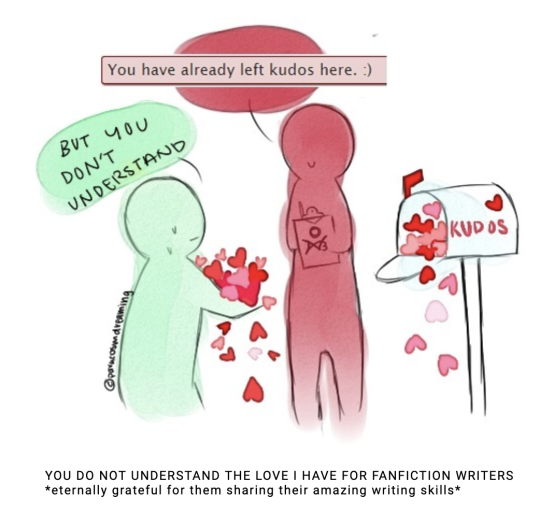
As of 2019, the archive boasts 4.7 million stories in more than 30,000 recognized fandoms (currently ranging from 07-Ghost to 킹덤) in 11 broad categories, posted by 1.8 million users and read by untold millions more. It receives an average of 179 million views a month; SimilarWeb ranks it as the No. 2 literary website (after the corporate fiction/fanfic site Wattpad), and within the top 200 websites globally.
For all of this to have grown out of a bunch of slash fangirls wanting a place to read their queer fanfiction is remarkable, especially given that those women planned, designed, and hand-coded the site from the ground up, all by themselves — a massive project undertaken during an era where women were still fighting to be taken seriously as designers and coders throughout Silicon Valley. (The AO3 runs on the Ruby on Rails source engine, for any tech types wondering.)
It’s been lauded for its incredibly sophisticated filtering system, which allows fans to aggressively curate their reading experiences. This requires a volunteer team of “tag wranglers,” whose sole job is to curate the many user-generated tags added to the archive daily; that’s in addition to the other hundreds of volunteers who maintain the site and contribute to the OTW’s other projects.
Also astonishing is that it remains supported fully by fans, who have kept the archive funded and the servers running purely through donations for the past decade. (For comparison, the internet’s other bastion of grassroots community, Reddit, was bought by Condé Nast in 2006, the year before the OTW was formed.)
What’s perhaps even more remarkable than all of this, given the legacy of cultural shame around fanfiction that the archive was formed in part to resist, is that AO3 has helped rehabilitate how fanfiction is perceived by the mainstream. In 2013, Time magazine named the Archive one of the best sites on the web. There are AO3 tag generators and a tag-of-the-day Tumblr. “You have already left kudos here” is a lowkey internet meme. It’s not uncommon to see once-isolated fans recognize each other on public transit because of the unmistakable look of the AO3 interface. AO3 has arguably boosted the average internet user’s understanding of fanfiction — and, crucially, this familiarity has come from a positive outgrowth of fandom community, rather than a corporatized promotion of it.
That legacy is represented by AO3’s Hugo nomination, recognized as a “huge deal” among followers of the archive and awards body.
This is a HUGE DEAL. This is a chance to say "fanfic is a legitimate and vital part of fandom" on our biggest stage.
— Seanan McGuire (@seananmcguire)
April 2, 2019
Much of AO3’s story is a story of alienation, of being an online outsider. Fanfiction is primarilythe bastion of women, queer, and genderqueer fans, who have long been barred from traditionally sanctioned (if equally culturally maligned) curatorial fandom, often due to prejudices. (Remember the “fake geek girl” meme?) Women have also been kept from Silicon Valley. Fanfiction is still dismissed as a serious literary genre, lampooned as something only shrill teen girls write — even though many of those girls grow up to become Hugo-winning authors themselves (who still write fanfiction).
The Hugos themselves, along with the broader culture of speculative fiction, have been undergoing a decade-long period of progressive reform to be more inclusive and diverse that neatly coincides with the rise of AO3. The Hugos have always represented innovation in genre and fandom, created by a lot of geeks and misfits, and AO3 represents the rise of a set of geeks and misfits who have long been invisible to Hugo voters.
Although this is the first year a fanfiction archive has been nominated, transformative fandom has slipped into or near the nominations before. The podcast Fangirl Happy Hour has been nominated several times in the category of Best Fancast, and the podcast Be the Serpent, which explicitly critiques and analyzes fanfiction by framing it as an important speculative literary tradition, is also nominated for Best Fancast this year. Several bloggers known for championing fanfiction, like Foz Meadows, have received nods within the Best Fan Writing category in recent years too.
So AO3’s nomination, given the turn the Hugos have gradually been making to embrace fandom more explicitly, feels less remarkable than inevitable — not just a legitimate literary organization saying, “We see you,” but rather, “We see you, and you’re one of us.”
The awards are a long-deserved acknowledgment of the tremendous driving force of creators working together to create a space for themselves — the strength of their talent, community, technology, literary skill, and sheer passion in making the world a little more their own.
0 notes
Text
February Wrap Up
Despite being the shortest month of the year, I read 7 books and 10 graphic novels, or 17 things in total. It was also another month where I read a lot of diverse genres: I read 10 contemporaries, 4 of which were thriller/mysteries, and 6 of which were romance; 4 sci-fi, 1 speculative historical romance, 1 fantasy romance and 1 historical fantasy. Instead of doing highest to lowest, since I have so many graphic novels and some are part of the same series, I decided to group them by the date read, so without further ado, let’s get into it.
Fence vol. 1-3 by C S Pacat and Joanna the Mad (3, 4, 3 stars)
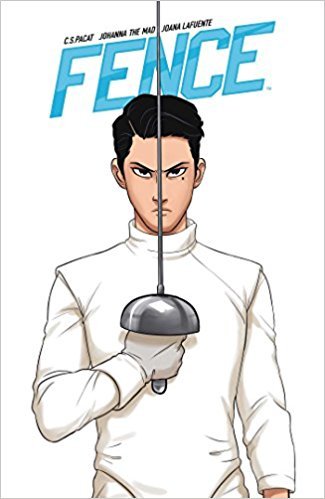

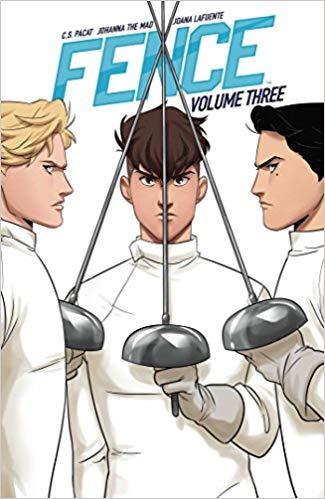
I wanted to read this series for a while, and I finally binged it this February. Fence follows Nicholas, a young fencer with a complicated past and poor background who comes to Kings Row, a school with the fourth best fencing programs in the country. There, to his shock he finds Senji, a junior champion with Olympic aspirations; and the two can’t stand each-other.
This series is just a whole lot of fun. It’s written like a Western style sports anime/manga, and Joanna the Mad’s artstyle is very reminiscent of manga, with lots of action line, pretty boys and expressive, large eyes. The first volume is a fine set up of Nicholas’ first confrontation with Senj, and arriving at the school, while the second and third volume deal with the qualifications at the school for who will make the fencing team. As Nick is on an athletic scholarship, he has to qualify or he gets kicked out, but like many of these series go, he has some stiff competition, and develops friendships with said competition.
I really enjoyed the dynamic between all the characters, especially Senji and Nicholas, and if you’re a fan of sports anime, cute queer comics, or painfully slow-burn enemies to lovers stories, check this out.
Check, Please! Year 3 by Ngozi Ukazu (4 stars)

The first thing I read in February was the third volume of Check, Please! This was as cute as the previous 2 volumes, as it follows Bittie’s third year in college. What struck out to me upon rereading this specific year, is that it actually has way more angst and conflict than I remember it having; there’s a lot here about Bittie and Jack coming to terms with not just their long distance relationship, but also coming out and finding acceptance within the confines of a major sports league like the NHL. It also deals a lot with Bittie coming to terms with the hockey team changing as Ransom, Holster and Lardo graduate. Overall, a good continuation of the story.
Deadly Class vol 1-2 by Rick Remender and Wes Craig (3, 2, 2 stars)
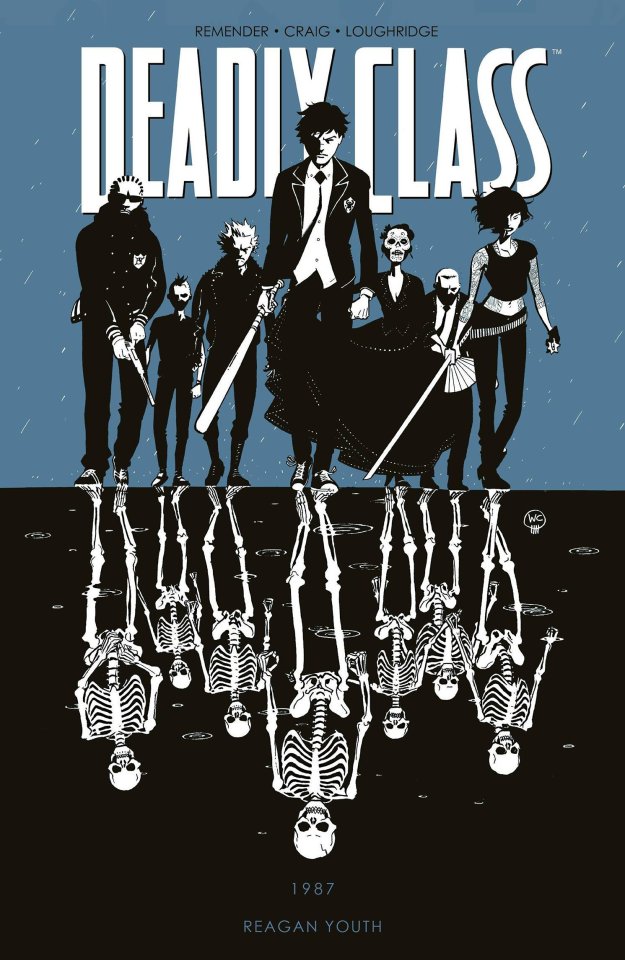
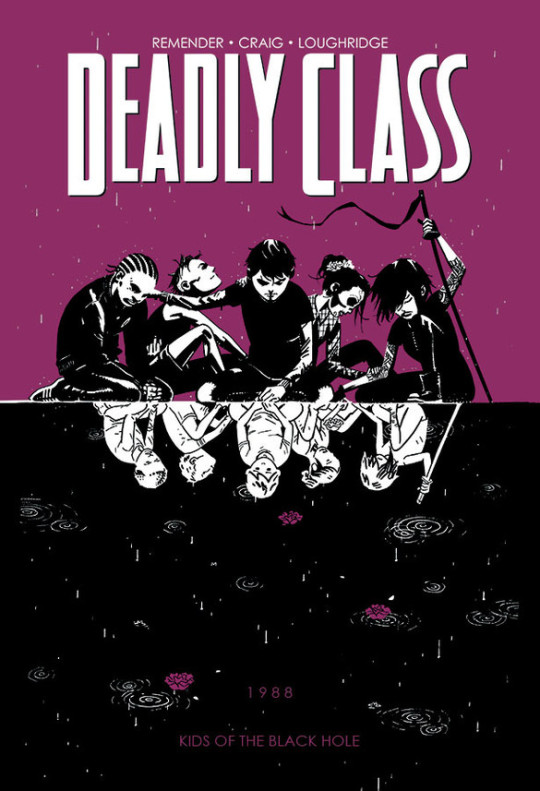

Deadly Class is a series that if I had started reading when I was in late high school, early college, I know I would have loved. However now, as an adult, I find it grating, pretentious, and far too extreme for no real reason. The story aspects that I liked the most, I’ve also already seen or read in far better works; it doesn’t help that up to volume 3, there are only 2 characters left that I remotely care about, and one of them just got introduced in that volume.
The series follows a group of kids who go to an elite training school for assassins. We mostly follow Marcus, the son of a Nicaraguan expats, who ends up at the school after he meets Saya and a few of the other students during a stick up. Though the first volume started out promising, volumes 2 and 3 kept getting less and less good, and unless something drastically changes in my life, I can’t see myself continuing on with this series.
Contagion by Erin Bowman (3 stars)

This is a sci-fi book set in the near-distant future, and it follows the crew of Odyssey, a research vessel that is sent to Black Quarry to investigate a distress signal. Once there, the crew realizes that something bad has happened, as they find bodies and a potentially deadly thing haunting them; and the mysterious ‘young boy’ the engineer of Black Quarry warns them about is not making matters any easier.
This was a rather mediocre sci-fi, but I still enjoyed it. As it’s part of a duology I will definitely be finishing the story out, but as is it doesn’t do too much with this well-tread premise. Bowman does have a good grasp on action and suspense, but a lot of the character decisions in the novel were akin to ones characters in Blumhouse horrors make, and considering most of them are some form of scientists, that wasn’t an ideal route to take. Still if you enjoy stories about aliens, sentient viruses, isolated space incidents and horror, it’s worth checking out.
Prince Charming by Rachel Hawkins (4 stars)
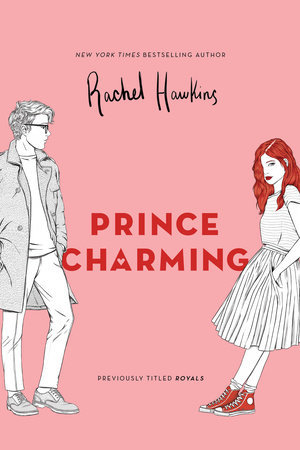
This is the first book in a series of contemporary romances, all centering around the fiction crown family of Scotland. In this first novel we follow Daisy, the younger sister of Eli, who gets engaged to Andrew, the Crown Prince of Scotland. After an incident in a parking lot with her ex, Daisy gets blackmailed into spending the summer in Scotland with her sister and fiance, and get acquainted with the royal family; cue shenanigans, romance and lots of sisterly yelling.
I was surprised at how much I enjoyed this book; it was very funny and entertaining, and I haven’t related to a characters quite like I did to Daisy, since Princess Mia Thermopolis. While there are some tropes these stories tend to have, Hawkins manages to avoid a lot of the cliches, and she actually has some really good commentary on the economy of the royal family, the outdated and outright sexist traditions, the close-mindedness, and the prejudice that both sides are steeped in at the start. I found the romance very cute, the shenanigans were funny and entertaining, and I will definitely be reading the sequel.
Heart of Gold Part 1 by Eli and Viv (4 stars)
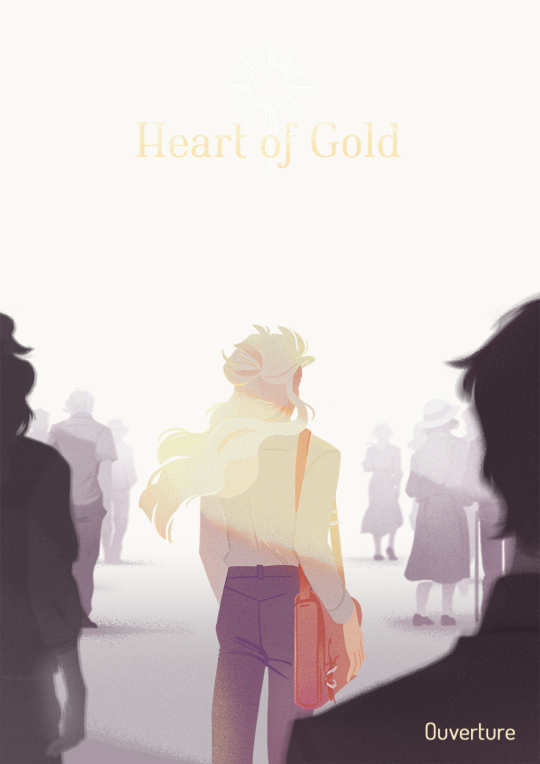
This is an webcomic that I stumbled onto by complete accident, but it blew me away. It follows Ionel, a concert pianist who is slowly losing his sight, and Kasper a priest with the power to heal people. Ionel moves to the small town and starts attending mass, in hopes that Kasper will heal him, but every time it gets close to, or his turn, Kasper refuses to help him. Through his attendance, the two become close, with Kasper seeming to have a crisis of faith, all while people from the town start dying; and they might be connected to Kasper.
This comic drew me in almost immediately. The art is absolutely beautiful, and it’s hard to believe that this is a free web comic. The story too is very mature and interesting; it deals a lot with religion, faith, and sacrifice, and the slow build of Isonel and Kaspar’s relationship feels very natural. I can’t wait for Act 2, and I’m really hoping the answers to what is happening in the town deliver on the build up we’ve gotten so far.
Truly Devious by Maureen Johnson (3 stars)

I heard about this book a lot when it came out, and I decided to check it out, since it’s a mystery following a girl who wants to become an FBI agent, coming to Ellingham Academy, a Montessori type private school, to solve an old cold case; that of the founder, Albert Ellingham’s daughter’s kidnapping.
I won’t lie; this book did not live up to the hype for me, though it was entertaining. I have a much longer and more detailed review of why, but it mostly boiled down to a few things. First, I didn’t like that it ends of a cliffhanger, and we get no answers; this is a bit odd for a mystery, especially a series which has more than two books. Second, I thought the way the past and present mystery connected wasn’t very well done, and I kept losing interest in the past, because of the way the book was written. And finally, I found some of the writing dry and lacking in proper atmosphere.
However, I still enjoyed the story, and the main character of Steve, and I will probably read the sequel, since I still want to know what happens.
S.T.A.G.S. by M A Bennet (3 stars)
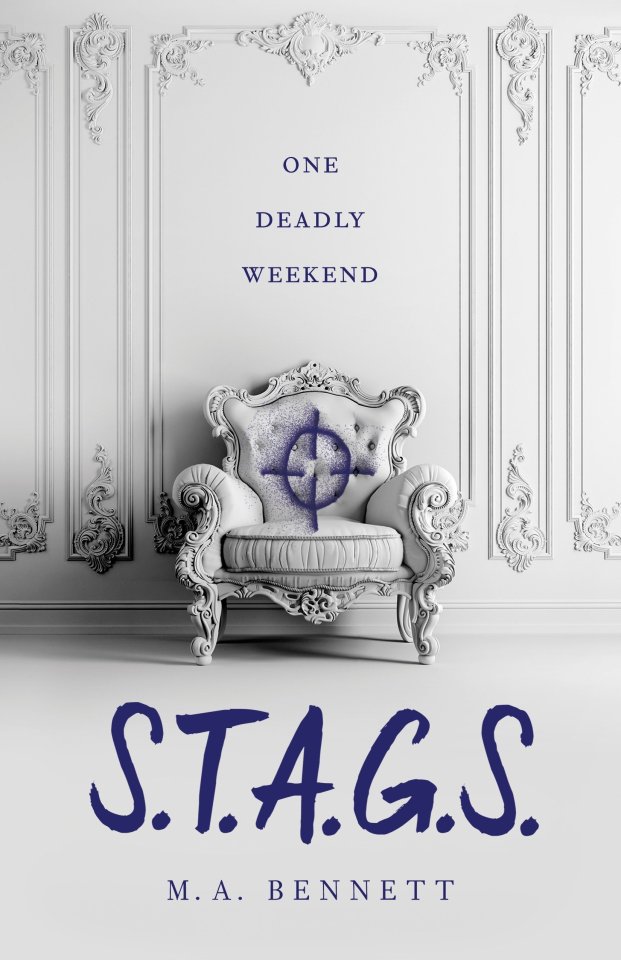
S.T.A.G.S. is a British thriller, set in Saint Aidan the Great’s School or STAGS, a private boarding school with a long tradition. When new student Greer gets invited to a weekend of huntin, shootin, fishin at the estate of the leader of the most popular clique in the school, Henry, she accepts, not knowing what waits for her; and what does is a nightmare that might turn deadly, where the hunting, shooting, and fishing, might be a little too real and dangerous.
I really enjoyed this thriller; I thought it was entertaining, fast paced and had a plot that kept me invested to the end. I also weirdly enjoyed the subtle romance between two of the characters, which isn’t often the case.
However, this book isn’t without it’s problems. The ending is a bit predictable, and having seen the Riot Club, I knew what I was getting into, in terms of what the weekend actually entailed. I also found that the book lacked a lot of tension, because we found out early on who lives through it. However, it was still enjoyable, and if you like these types of thrillers set in boarding schools or private estates, I think you will enjoy this one.
Undead Girl Gang by Lily Anderson (4 stars)
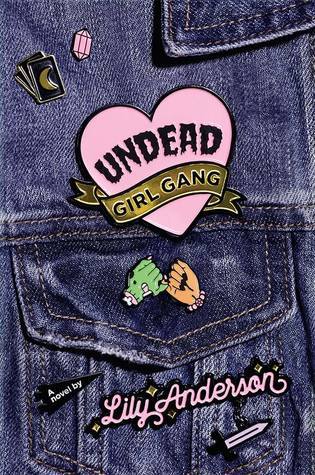
Like Prince Charming before, I was genuinely surprised at how much I ended up enjoying this book, because when I started it, I was really caught off guard by the humor. However, once I got used to it, this became one of the funniest things I read this month.
Undead Girl Gang is a horror/comedy that follows Mila, a Mexican-American teenager who practices Wicca. After her best friend Riley supposedly commits suicide, just a week after a double suicide of two of her other classmates, Mila decides to perform a spell and bring Riley back; but instead she brings all three of the girls back. The problem? They can’t stand each-other, and if they don’t want to be walking zombies, they need to stay within a 100 steps of Mila.
This book was hilarious and very dark. I really enjoyed all the relationships between the girls, and I found the look at grief very well done and moving. The ending was climactic, and the conclusions Mila comes to worked well for me; if you enjoyed the Craft, Mean Girls or Heathers, check this out, you will probably like it.
Gilded Wolves by Roshani Chokshi (5 stars)

This was by far my favorite thing I read this month. I struggled writing a review for it, because I just didn’t know how to talk about it without just relegating to spoilers and gushing about the characters and the puzzles. It’s a book that follows a group of thieves, who steal magical artifacts, each with their own motivations and goals. When they steal a magical Chinese compass, the discover that it leads them to a Horus Eye; an artifact so powerful it can show them the way to the fabled Fragment of Babel.
It’s the Mummy, mixed with National Treasure, mixed with Ocean’s 11. It’s fun heist story, set during the Exposition Universelle, and if you are like me at all and like any of these things, you will love this book.
Sleepless vol. 1 by Sarah Vaughan (4 stars)

This was probably my favorite of the graphic novels I read; it’s a fantasy that follows Poppy, the illegitimate daughter of a King, and a famous star reader. When her father the King dies, Poppy is forced to navigate court life, as his brother takes the throne, but things become increasingly hard as several assassination attempts are made, and her Sleepless protector Cyrenic starts drifting.
There’s just something about this series that ticks all my boxes. The art is absolutely gorgeous, the story is interesting and a bit different from the usual fantasy I read, and the Sleepless vow is a very unique type of magic. To top it off, I really like the two leads, Poppy and Cyrenic and I’m curious to see what turn the story will take after the ending we get in issue 6.
Motor Crush vol. 1 by Brenden Fletcher (3 stars)
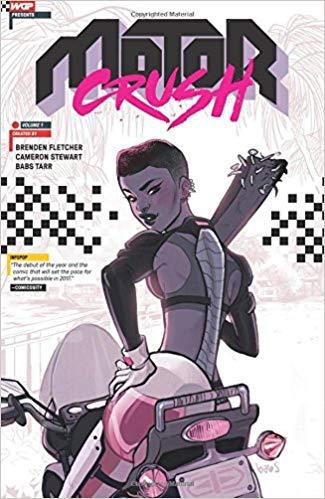
I’ve been meaning to start this series for a while, and I finally did in February, and man was it a great time to do this, fresh after seeing Battle Angel Alita.
This follows Domino, a bike racer, who is trying to make it big and qualify for the world circuit. However, to survive she needs Crash, an illegal substance that is used to fuel the bikes in this universe, but she needs to inhale it. Through the first volume we find out a bit about her mysterious past, her ex-girlfriend Lola, and a man who seems to either want to help her or kill her; all while she races to win the qualifications and the Crash.
This series was a fun, fast paced ride, but it’s not without its problems. The art is beautiful, but the story needs some more polishing; there’s too many plot threads and not enough time to develop them. I can’t imagine how things will resolve in the next volume after that climax, but I will definitely be continuing it; the world was gripping enough to have me enjoy it, and Domino was a character I definitely rooted for.
Umbrella Academy vol. 1 by Gerard Way (3 stars)
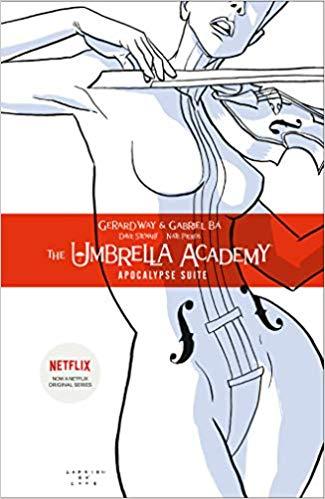
Since the show is all anyone talks about, I decided to finally start this series and boy is it cooky. We follow the Umbrella Academy, a group of 7, who were adopted by a crazy millionaire savant Reginald Hargreeves, after being born in a spontaneous event all over the world where 48 mothers gave birth. Hargreeves trains the kids to stop the apocalypse, and now 10 years after his death brings 6 of the 7 back to his house, unaware that the apocalypse is here; and it’s a direct consequence of their reunification.
There is a lot of good and a lot of weird in this series. The characters have glimpses of interesting personalities and the idea of 7 kids being raised from birth to be superheroes by a man who is a British version of Ra’s al Ghul is interesting. But unfortunately the series doesn’t fully explore this, and the ending is really abrupt. The humor is quirky, and sometimes it works, but more often it makes the tone weirdly uneven, as we swing from graphic, albeit cartoon violence to slapstick. I think the show does a much better job with the tone, and while this first volume gets a lot right, it’s by no means perfect.
Sadie by Courtney Summers (4 stars)
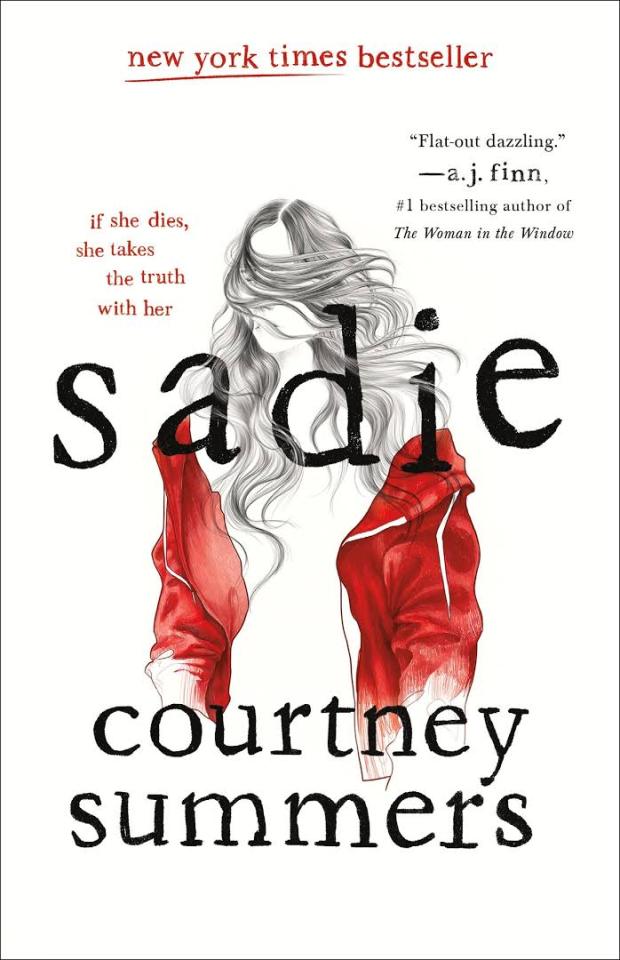
This was by far the hardest book I’ve read in a long time. It’s a mystery that follows Sadie, a girl who disappears after her younger sister is brutally assaulted and murdered; and West McCray, a podcast host who is retracing her steps, trying to find her. It’s a book about grief, assault, pedophilia, violence and the lies we tell ourselves so we don’t have to think about what happens to girls in this world, and it’s dower, dreary and oh so real. It made me feel things I don’t normally do when I read, and if you can stomach the content, I recommend it. If you can, get the audiobook; it’s a full cast and the podcast bits are done like a real podcast, which makes the story feel that much more immersive.
The Disasters by M K England (5 stars)

I needed something light and fun after the last two things I read in February, and this was the perfect way to end my month. This was my favorite book I read so far, maybe even more than the Gilded Wolves. It’s a sci-fi that follows a group of 4 rejects from Space Academy who have to work together to survive a terrorist attack, and prevent another one from happening. It’s fast paced, incredibly entertaining, and I fell in love with all the characters.
I absolutely cannot wait for whatever else M K England publishes, and I loved this to pieces.
0 notes
Text
GENRE FICTION COMMENTARY
"A short story is a different thing altogether – a short story is like a quick kiss in the dark from a stranger." (King 1985)
In class, we learned that short stories don't need to be super dramatic. They can be about something slight, and that revelation somehow changes things. You can describe it as seeing a story from the corner of your eye, rather than a full picture.
The four genres we are currently studying within this module are Crime, Horror, Fantasy, Science Fiction, and some sub-genres that fall in between.
Fantasy is a part of speculative fiction, and elements of fantasy can even be found in early texts such as The Epics of Gilgamesh (Gilgamesh 2100 BC). Common conventions of the fantasy genre include the use of magic and supernaturalism. Fantasy often relies on the reader to suspend their disbelief, and put aside what they know to be ‘real' in order to fully submit to the world of the story.
Favourites such as Lord of the Rings (Tolkien 1954) are often associated with fantasy, however, contemporary fantasy also includes dystopian literature, which is hugely popular right now. For example, The Hunger Games (Collins 2012) and The Maze Runner series (Dashner 2013) are popular YA fantasy which have achieved commercial success.

There are also many sub-genres of science fiction, such as punk (steampunk, cyberpunk etc.), Hard vs. soft sci-fi, post-apocalyptic fiction, which were outlined in Jim Clark's lecture. Whilst world building can be very technical within this genre, it is important not to use too much jargon or unnecessary information about your world, as it can take away from the readers belief (Novum), e.g. time travel.
Isaac Asimov, the writer of I, Robot, believes that ‘Science fiction can be defined as that branch of literature which deals with the reaction of human beings to changes in science and technology.' (Asimov 1981).
We are learning about horror right now, however, I have written horror before. Some elements of horror stories are a dark mood and atmosphere, exploring the darker side of humanity, unexpected incidents, violence and gore, etc. In addition to this, Gothic horror is often very sensual.
It is important to consider that genres are constantly evolving, and elements of the genres mentioned are constantly in flux. What is popular right now may not be popular in a few years, or on the hand, it could have a cult status like Dracula (Stoker 1897).
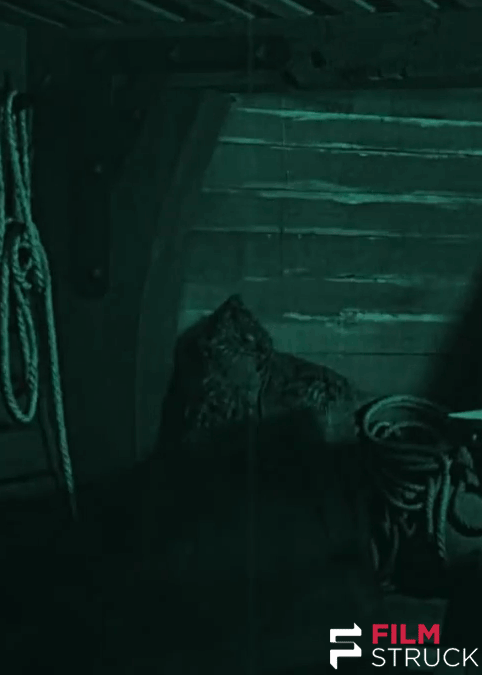
The trouble with genre is that it can be restrictive or formulaic for writers whose ideas may not fit neatly within the confines of a certain genre, in which case writers can consider their work as literary fiction. When showing our writing to publishers, it may be off-putting for them if our work isn't easily marketable.
On the other hand, fitting within a genre can also be useful when categorising a book in a bookshop or online. It is easier for target audiences to find our books if they fit into a genre, but they can equally get lost amongst of other books within that genre.
In her book ‘Writing short stories', Ailsa Cox writes that ‘The short story is a protean form, encompassing infinite variations, and just like the novel, shading into other genres' (Cox 2016).
My short story is about a twenty-five year old man named Saeed, who is being held captive in a small, bare house in an unidentified location. This first-person narrative voice follows the reader through his daily routine of eating, sleeping, writing etc. His compulsive habits frame him as a strange character, but I want the reader to feel sympathetic of him. He describes his parents as mute but menacing, claiming that he would be instantly killed if he ever tried to escape.
My story falls within the crime genre and is a psychological thriller. Writer David Lyons, who recently held a workshop with us regarding psychological thrillers and their current popularity, gave us an insight into some common features of this particular sub-genre. Crime fiction often deals with mystery, suspense, tension etc. Psychological thrillers deal with all of these things too, however, they often focus on the mental state/mind frame of the narrator more so.
I am currently writing the second draft of my short story. Taking into consideration the elements of a short story, I am now working on further developing my characters, theme, setting, conflict, plot, and P.O.V. All of these elements are important in my eyes, but because I'm using an unreliable narrator as the protagonist of my short story, P.O.V. is the most challenging element. I am trying to keep my character believable and relatable, without making him predictable or dull. His strangeness is what causes intrigue, and will hopefully keep the reader wanting to know more about him and his situation.
The conflict begins as an external one, with man vs. man (his parents who he believes are holding him captive), but ends up being an internal conflict all along (man vs. self).
The unreliable female narrator is massively popular right now, with novels such as Gone Girl (Flynn 2013) and Girl on the Train (Hawkins 2015) having major success and even becoming award-winning films. However, Stephen King is arguably the king of psychological thrillers when it comes to literature.
In light of the times up movement, author Stephanie Merritt wrote an article on how the ‘cult' of the unreliable narrator must be stopped. She writes that ‘writing a woman who is off-kilter… might inadvertently reinforce a stereotype of neurotic women, slaves to their biology' (Merritt 2018). Whilst I don't believe that the problem is that severe, I do see a pattern in the unreliable female narrator, and understand how it can feed into the stereotype of the crazy, untrustworthy woman.

With women's experiences with sexual predators being in the limelight right now, is it clever to portray women and their testimonies as untrustworthy? I believe in considering real-life situations in my writing, which is why I decided to use a male unreliable narrator. Rather than having ‘Girl in captive' which sounds more like the titles that are already on the market, I am naming my short story ‘Man in Captive'.
This was more common in the 90's/00's with books/films such as Fight Club (Palahniuk 1997), and The Talented Mr Ripley (Highsmith 1999), both of which were highly popular. The character of Tyler Durden in Fight Club has some similarities with my character, in the sense that they can both be seen as cynical characters facing the unfamiliar, and the fact that they are both unreliable but this isn't revealed until the end.
The relevance of my short story within this current political and social climate is that it does not add to the masses of books written from an unreliable woman's point of view. In addition to this, it also normalises the idea that men also suffer from mental health problems, and that not all of these illnesses manifest in the same way.
When comparing the novels mentioned about with my short story, they have some similarities. For example, this quote from Fight Club, "Everyone smiles with that invisible gun to their head." (Palahniuk 1997) carries the same sentiment as one of my narrator's lines ‘We're all one bad day away from driving off a cliff'. Pessimistic narrative voices are also common in many psychological thrillers, but not all.

I've also taken the idea of captivity, where in many films and books, girls and women are held captive rather than men. The idea that it is an adult man rather than a child, is again, uncommon.
In regards to structure and plot, I did a lot of reading and research around short stories and how they differ to structuring or plotting a novel, but this quote by author Isobelle Carmody sums up what most texts explained.
‘Short stories do not say this happened and this happened and this happened. They are a microcosm and a magnification rather than a linear progression’ (Carmody and McNab 2013).
As evident earlier on in my writer's diary, my initial ideas were too complicated. They had too many characters and too much action. The subtlety and unique nuances that make a short story a genre in its own right, rather than a condensed novel, were being lost beneath huge plot lines and complicated structures.
In order to capture a moment in time, I start my story eight months into the captivity of Saeed. I have two current versions of my story, one written as a diary. I'm not sure which one I will submit yet.
I also have currently written two endings to my story. In the first ending, there's a frantic knock on the door, and behind the door are his parents, who embrace him. Behind them are the police. He's been missing for eight months and his parents tracked him down through his Amazon account deliveries, where he ordered food and other necessities in bulk before his captivity. It turns out that he had been holding himself captive. He says he doesn't recognise these people posing as his parents, but they show him pictures. He doesn't trust them and lashes out. The short story ends with him in a psychiatric ward. He doesn't understand why this woman who calls herself his mother is crying.
The second ending is more subtle, where he hears a cat meowing outside of his front door. Knowing that his parents would be angry if he touches the door handle, he hesitates. But then he remembers back to his childhood when he used to have a black cat, so he opens the door and steps out. The cat is in the front driveway. He takes his first step out of the house, picks up the cat, and goes back inside. He opens the curtains, opens all of the doors, and it is revealed that there are no parents holding him captive. The story ends there.
I favour the second ending more, however, I am still receiving feedback from my tutors and my writing group. I agree that ‘A short story must have a single mood and every sentence must build towards it' (Poe 1846), and the second ending aligns with the strange mood of my short story more, rather than the first ones dramatic ending.
I also considered Freytag's pyramid (Freytag 2004). For example, in the second ending, the exposition is setting the scene of a day in the life in captivity for Saeed. The inciting incident and rising action are very subtle, along with the climax, where he hears the cat and opens the door. The falling action is the internal battle between whether he should leave or not. The resolution is open-ended, as we don't know what happens after he opens the door. In a way, the resolution is his decision to open the door.
Looking back, I probably should have decided on whether to write diary extracts or not or which ending to go with, before writing them both. However, writing two versions of my short story, as well as alternative endings has allowed me to experiment more with short story writing, and gain a better appreciation to find just the right balance of everything when writing a short story.
In the current world where twitter fiction, fifty-word stories, even six-word stories are popular, I believe that it is a great time to write a short story. It is something that people can read in a few hours on their day off, or on a very long lunch break.
I could self-publish my short story on Amazon, or use my social media accounts to share my story with people who are already familiar with my writing. There are publications such as Ambit Magazine and Dark Lane which I could submit my work to, however, many places that take submissions often ask for specific genres or word counts, so I will have to make sure that I fit the criteria. For example, Dark Lane specifies well-written, literary ‘weird' tales, and they dislike blood and gore (Dark Lane 2018).
I will consult with my writer's group and lecturers to figure out which would be the best route for me, however, I am still looking into magazines that take short story submissions. I could even ask to publish the opening of my story in the CovWords magazine, and then post the rest on my blog so people can read it for free. As a novice writer, this may be a good way to receive feedback on my writing from readers before submitting to publications.

REFERENCES
Anthology Submissions (2018) available from <http://darklane.webs.com/anthologysubmissions.htm> [2 March 2018]
Asimov, I. and Zimmerman, R. (1981) Asimov On Science Fiction. Garden City, N.Y.: Doubleday
Carmody, I. and McNab, N. (2013) The Wilful Eye. Crows Nest: Allen & Unwin Children’s
Collins, S. (2012) The Hunger Games. New York: Large Print Press
Cox, A. (2016) Writing Short Stories. 2nd edn. Abingdon: Routledge
Dashner, J. (2013) The Maze Runner Files. London: Random House Children’s Books
Freytag, G. (2004) Technique Of The Drama: An Exposition Of Dramatic Composition And Art. 2nd edn. Sacramento: University Press of the Pacific
Flynn, G. (2013) Gone Girl. London: Phoenix
Hawkins, P. (2015) The Girl On The Train. London: Doubleday
Highsmith, P. (1999) The Talented Mr. Ripley. London: Hutchinson
King, S. (1985) Skeleton Crew ; Different Seasons. London: Little, Brown
Merritt, S. (2018) The Cult Of The Unreliable Female Narrator Must Be Stopped | Stephanie Merritt [online] available from <https://www.theguardian.com/commentisfree/2018/feb/19/cult-women-unreliable-narrators-literature-film-feminism> [2 March 2018]
Palahniuk, C. (1997) Fight Club. London: Vintage Books
Poe, E. (1846) The Philosophy Of Composition [online] available from <https://www.eapoe.org/works/essays/philcomp.htm> [2 March 2018]
Sandars, N. (2000) The Epic Of Gilgamesh. London: Penguin Books
Stoker, B. (2014) Dracula. New York: Penguin Books
Tolkien, J. R. R. (1954) The Lord Of The Rings. London: HarperCollins
0 notes